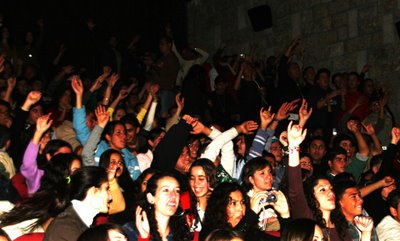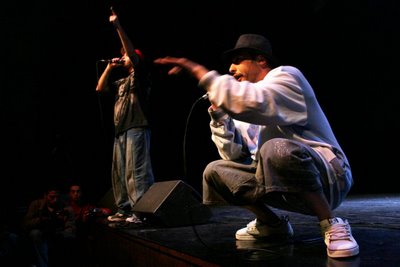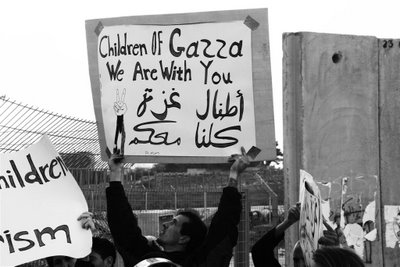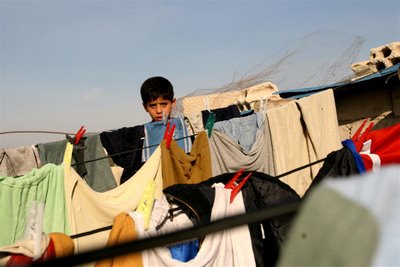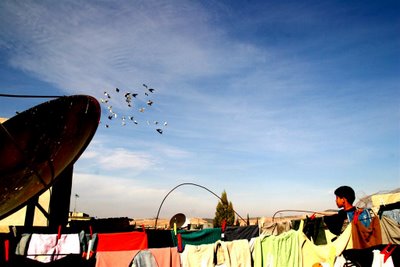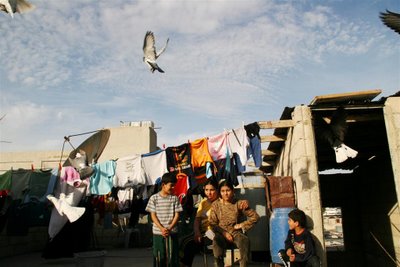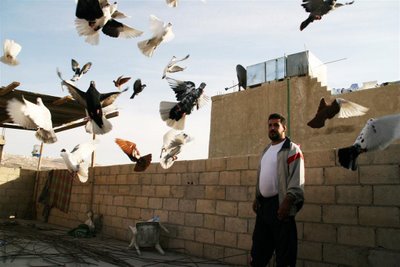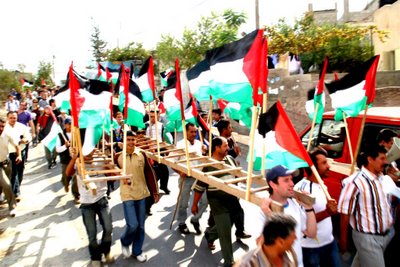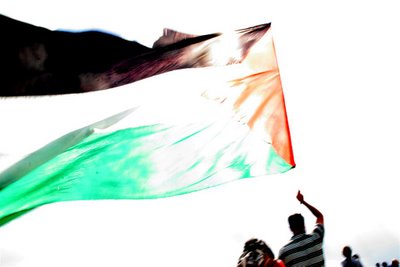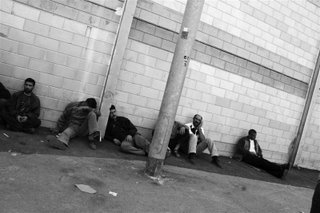B'Tselem: Israeli security forces killed 660 Palestinians during 2006
By Haaretz Service
According to an annual B'Tselem report, from the beginning of 2006 to December 27, Israeli security forces have killed 660 Palestinians, a figure more than three times the number of Palestinians killed in 2005, which was 197.
The data compiled by the human rights organization also indicated a significant decrease in Israeli casualties. Palestinians killed 23 Israelis in 2006 - 17 civilians, among them one minor, and six Israel Defense Forces soldiers. The figure constitutes less than half of the 50 Israelis killed in 2005.
B'Tselem also listed the overall figures for casualties since the beginning of the intifada, with Palestinian casualties at 4005 and Israeli casualties at 1017, 701 of which were civilians.
Advertisement
The report states that 2006 saw an improvement in the realization on Israeli civilians' right to life, while, on the other hand, also seeing "a deterioration in the human rights situation in the occupied territories, particularly in the increase in civilians killed and the destruction of houses and infrastructure in the Gaza Strip."
According to the report, about half of the Palestinians killed, 322, did not take part in the hostilities at the time they were killed. 22 of those killed were targets of assassinations, and 141 were minors.
The report says the majority of Palestinian casualties were killed in the Gaza Strip in the second half of 2006, following the capture of IDF Corporal Gilad Shalit. During this period, 405 Palestinians were killed in the Gaza Strip alone, of them 88 were minors and 205 did not take part in the hostilities at the time they were killed.
According to the report, the IDF demolished 292 Palestinian houses, 95 percent of them in the Gaza Strip. These were home to 1,769 people.
B'Tselem's report says the owners of 80 of the homes received advance warning to the demolition. Israel demolished 42 additional homes in East Jerusalem that were built without a permit. These were home to about 80 people, according to the report.
The report indicates that movement restrictions in the West Bank became more severe in 2006. Israel currently maintains 54 permanent checkpoints in the West Bank that are usually staffed, and 12 other checkpoints within the city of Hebron.
According to the United Nations Office for the Coordination of Humanitarian Affairs, there is an average of 160 flying checkpoints throughout the West Bank every week.
In addition to the checkpoints, the report says IDF has erected hundreds of physical obstacles such as concrete blocks, dirt piles and trenches to restrict access to and from Palestinian communities. Palestinians have restricted access to 41 roadways in the West Bank, to which Israelis have unlimited access.
According to the report, as of November, Israel held 9,075 Palestinians in custody, including 345 minors. Of these, 738, including 22 minors, were held in administrative detention without trial and with no knowledge of the charges against them.
Chroniques d'une photographe,specialiste des droits humains en Palestine et ailleurs, Chronicles of a French photographer, specialist in human rights, in Palestine and elsewhere
Thursday, December 28, 2006
Wednesday, December 27, 2006
Thursday, December 21, 2006
another lie from IDF
IDF:
On the afternoon of December 8, 2006, IDF troops identified several armed
Palestinians in the Al Aida refugee camp in Bethlehem. The troops fired and
hit one of the armed men after clearly identifying him as an armed adult
Palestinian. After checking with all the involved forces, the IDF does not
recognize the further harming of any Palestinian in this incident except for
the one already mentioned. It is important to note that in the past three
months there has been a large increase of terror activities against IDF
troops from Al Aida refugee camp area, including the hurling of dozens of
explosives and the shooting onto the roads between the refugee camp and city
of Bethlehem.
On the afternoon of December 8, 2006, IDF troops identified several armed
Palestinians in the Al Aida refugee camp in Bethlehem. The troops fired and
hit one of the armed men after clearly identifying him as an armed adult
Palestinian. After checking with all the involved forces, the IDF does not
recognize the further harming of any Palestinian in this incident except for
the one already mentioned. It is important to note that in the past three
months there has been a large increase of terror activities against IDF
troops from Al Aida refugee camp area, including the hurling of dozens of
explosives and the shooting onto the roads between the refugee camp and city
of Bethlehem.
Monday, December 18, 2006
article: what are you going to do now Israel?
(8) What Are You Going to Do Now, Israel?
>
> By VIRGINIA TILLEY
>
> Counterpunch
> 15 December 2006
>
> http://www.counterpunch.com/tilley12152006.html
>
> Johannesburg, South Africa
>
> What are you going to do now, Israel?
>
> Now that three small boys have been killed by assassins'
> bullets, and a Hamas judge dragged from his car and
> murdered, perhaps you are pleased. The Palestinians are
> finally succumbing to your plots, you think. The
> long-planned bottle has finally been sealed, in which the
> "drunken cockroaches" can only crawl around, shooting each
> other.
>
> Maybe you are sitting back in your national chair, rubbing
> your hands together in triumph, watching the Palestinians
> finally turn on each other, slowly becoming what you
> always claimed they were. Maybe you are repelled, secure
> in your sense of superiority.
>
> But have you thought about what you are you going to do,
> if Palestinian leadership you despise finally
> disintegrates?
>
> You have brought them to this pass, of course. You worked
> for decades to achieve exactly this. You bribed,
> terrorized, expelled, maimed or killed their leadership,
> banned or killed their visionaries and philosophers,
> fanned and funded Hamas against Fatah or Fatah against
> Hamas, trashed their democracy, stole their money, walled
> them in, put them on a "diet", derided their claims, and
> lied about their history to the world and to yourself.
>
> But what are you going to do, Israel, if five million
> Palestinians are finally living leaderless under your
> sovereignty? What will you do, when they lose their
> capacity to negotiate with you? Have you thought that,
> within the territory you control, they are as many as you?
> And that now you are destroying their unified voice? Have
> you thought about what will happen to you if they truly
> lose that voice?
>
> Maybe you really believe that, if you only feed Fatah
> money and guns, Fatah will reclaim power from the Hamas
> and restore the craven puppet Palestinian government of
> your dreams. Maybe you actually believe that Fatah can
> revive the wreck of Oslo, step out of the rubble of PA
> offices, and reclaim the driver's seat of the Palestinian
> nation as before. Maybe you are telling yourself that,
> with just a few more inter-factional scuffles and
> assassinations and little more starvation, the entire
> Palestinian people will turn on Hamas and eject it from
> power in favor of grinning Mr. Abbas.
>
> But why would you believe all this, when the only other
> test-case, Iraq, is in ruins and the US and UK are
> desperately trying to flee?
>
> Do you really still live so deeply in your own fantasies
> that you believe Palestinian resistance is just the
> product of bad or obdurate leadership? That no collective
> memory of expulsion and dispossession sustains the spirit
> of collective resistance that will always and inevitably
> transcend that leadership? Do you really believe that, if
> only you can crush or co-opt Hamas and Fatah, five million
> people will simply disappear forever from your
> world--trail off across the Jordanian or Egyptian borders
> into the endless desert, clutching clothes, kids, and
> tarnished mementos, in some great reprise of 1948?
>
> Do you actually think that, if the international community
> finally lets you off the hook of negotiating with the
> people you have dispossessed and discredited, you will
> somehow walk free at last, your crimes against them
> forgotten?
>
> We know you are still pursuing the old, fatal, futile
> fantasy: finally to redeem the Zionist dream by
> demolishing Palestinian nationalism. To break Palestinian
> national unity on the rocks of occupation. To reduce the
> Palestinians to Indians on reservations who decline into
> despair, alcoholism and emigration. To make them
> irrelevant to you.
>
> But here is news for you, Israel. The Native Americans
> haven't given up to this day. Damaged and reduced as they
> are, they know their history and remember their
> grievances. They are marginal only because they are one
> percent of the US population. The Palestinians are
> five-million strong, equal to you in numbers. And they
> live within your borders. When their leadership ruins
> itself, bashing each other like rams fighting to the
> death, they will finally turn their five million pairs of
> burning eyes on you, for you will be the only power left
> over them. And you will be defenseless, because your paper
> shelter - your Fatah or PA quislings - will be damaged
> goods, cracked vessels, discredited, gone. And it will
> then be you and those you have disenfranchised - you and
> the Palestinians, in one state, with no Oslo or Road Map
> myth to protect you. And by then, they will truly hate
> you.
>
> Then perhaps it will dawn on you what you have done, when
> the disintegration of Palestinian national unity spreads
> out like a tsunami through the Middle East, meeting up
> with the tsunami spreading out from Iraq, to lay the
> region waste and rebound on you.
>
> Watching you create this catastrophe for yourself, we
> think you are simply suicidal. We could just watch, but
> your road to ruin promises too much suffering to too many
> people. Still, to avert your unilateral suicide pact with
> the Palestinians, to whom can we turn? We could appeal to
> Hamas at last to mobilize the rank and file, who alone
> have the capacity to launch civil disobedience on the mass
> scale necessary to paralyse Israel's iron fist, but Hamas
> has no experience with this method, and now its statesmen
> are cornered by the guns you gave to Fatah thugs.
>
> We could appeal to the leader of the Fatah thugs, Mr.
> Abbas, shuffling at the feet of Israeli power, to find
> some spine. Or to the ubiquitous Mr. Erekat, who never had
> a political vision in his life, to develop one overnight.
>
> We could appeal to the Fatah thugs to reject Mr. Abbas and
> Mr. Erekat and the fat cement contracts you gave them to
> build the Wall that imprisons them, and seek a high road
> they have never glimpsed.
>
> We could appeal to the microscopic PFLP and DFLP,
> clutching their old programs too stale to chew and
> consumed by their acrid, decades-old bitterness and
> rivalry with Fatah, to lift their heads at long last
> beyond the old and new grievances.
>
> We could appeal to the US, but no one bothers to do that.
>
> We could appeal to the EU, but no one bothers to do that,
> either.
>
> We could appeal to the world, but it only stands aghast.
>
> We could appeal to the world media, but it is frozen with
> its ass in the air.
>
> We can only appeal to you, Israel. To think what you are
> doing, if not to care.
>
> For you are crafting your own destruction.
>
> You have been so effective in this great national project
> because you work from experience. Even the most
> courageous, principled, and sensible people, as you
> learned, cannot withstand a concentration camp
> indefinitely. At some point, as the Holocaust historians
> have tracked with such pathos, humanity breaks down.
> Individual heroism may survive as memoirs, but order,
> humanity, and finally human feeling decays into factional
> squabbles and man's inhumanity to man. You learned all too
> well and bitterly how this cauldron can melt down the very
> fabric of a society and shatter people. The lesson is
> burned, literally, into your national memory. And you are
> bringing those lessons to bear, attempting to purge
> Zionism's tragedy by bringing Gaza to ruin.
>
> But if you actually reap the chaos you are crafting for
> the Palestinians, you will find that no one else is
> responsible for these five million civilians except you.
>
> So what will you do, Israel, with five million people
> living under your rule, when you can no longer pretend to
> the world that you intend to negotiate with them? What
> will you do with people you detest, and who finally
> utterly detest you, when visions of coexistence have
> finally failed? You will be the only sovereign power over
> them. You will be able neither to digest them nor to vomit
> them out. And they will stare at you. And we will stare at
> you, too.
>
> Because there will be no one left to blame, and no one to
> take care of them, except you.
>
> Virginia Tilley is a professor of political science, a US
> citizen working in South Africa, and author of The
> One-State Solution: A Breakthrough for Peace in the
> Israeli-Palestinian Deadlock (University of Michigan Press
> and Manchester University Press, 2005). She can be reached
> at tilley@hws.edu.
>
> By VIRGINIA TILLEY
>
> Counterpunch
> 15 December 2006
>
> http://www.counterpunch.com/tilley12152006.html
>
> Johannesburg, South Africa
>
> What are you going to do now, Israel?
>
> Now that three small boys have been killed by assassins'
> bullets, and a Hamas judge dragged from his car and
> murdered, perhaps you are pleased. The Palestinians are
> finally succumbing to your plots, you think. The
> long-planned bottle has finally been sealed, in which the
> "drunken cockroaches" can only crawl around, shooting each
> other.
>
> Maybe you are sitting back in your national chair, rubbing
> your hands together in triumph, watching the Palestinians
> finally turn on each other, slowly becoming what you
> always claimed they were. Maybe you are repelled, secure
> in your sense of superiority.
>
> But have you thought about what you are you going to do,
> if Palestinian leadership you despise finally
> disintegrates?
>
> You have brought them to this pass, of course. You worked
> for decades to achieve exactly this. You bribed,
> terrorized, expelled, maimed or killed their leadership,
> banned or killed their visionaries and philosophers,
> fanned and funded Hamas against Fatah or Fatah against
> Hamas, trashed their democracy, stole their money, walled
> them in, put them on a "diet", derided their claims, and
> lied about their history to the world and to yourself.
>
> But what are you going to do, Israel, if five million
> Palestinians are finally living leaderless under your
> sovereignty? What will you do, when they lose their
> capacity to negotiate with you? Have you thought that,
> within the territory you control, they are as many as you?
> And that now you are destroying their unified voice? Have
> you thought about what will happen to you if they truly
> lose that voice?
>
> Maybe you really believe that, if you only feed Fatah
> money and guns, Fatah will reclaim power from the Hamas
> and restore the craven puppet Palestinian government of
> your dreams. Maybe you actually believe that Fatah can
> revive the wreck of Oslo, step out of the rubble of PA
> offices, and reclaim the driver's seat of the Palestinian
> nation as before. Maybe you are telling yourself that,
> with just a few more inter-factional scuffles and
> assassinations and little more starvation, the entire
> Palestinian people will turn on Hamas and eject it from
> power in favor of grinning Mr. Abbas.
>
> But why would you believe all this, when the only other
> test-case, Iraq, is in ruins and the US and UK are
> desperately trying to flee?
>
> Do you really still live so deeply in your own fantasies
> that you believe Palestinian resistance is just the
> product of bad or obdurate leadership? That no collective
> memory of expulsion and dispossession sustains the spirit
> of collective resistance that will always and inevitably
> transcend that leadership? Do you really believe that, if
> only you can crush or co-opt Hamas and Fatah, five million
> people will simply disappear forever from your
> world--trail off across the Jordanian or Egyptian borders
> into the endless desert, clutching clothes, kids, and
> tarnished mementos, in some great reprise of 1948?
>
> Do you actually think that, if the international community
> finally lets you off the hook of negotiating with the
> people you have dispossessed and discredited, you will
> somehow walk free at last, your crimes against them
> forgotten?
>
> We know you are still pursuing the old, fatal, futile
> fantasy: finally to redeem the Zionist dream by
> demolishing Palestinian nationalism. To break Palestinian
> national unity on the rocks of occupation. To reduce the
> Palestinians to Indians on reservations who decline into
> despair, alcoholism and emigration. To make them
> irrelevant to you.
>
> But here is news for you, Israel. The Native Americans
> haven't given up to this day. Damaged and reduced as they
> are, they know their history and remember their
> grievances. They are marginal only because they are one
> percent of the US population. The Palestinians are
> five-million strong, equal to you in numbers. And they
> live within your borders. When their leadership ruins
> itself, bashing each other like rams fighting to the
> death, they will finally turn their five million pairs of
> burning eyes on you, for you will be the only power left
> over them. And you will be defenseless, because your paper
> shelter - your Fatah or PA quislings - will be damaged
> goods, cracked vessels, discredited, gone. And it will
> then be you and those you have disenfranchised - you and
> the Palestinians, in one state, with no Oslo or Road Map
> myth to protect you. And by then, they will truly hate
> you.
>
> Then perhaps it will dawn on you what you have done, when
> the disintegration of Palestinian national unity spreads
> out like a tsunami through the Middle East, meeting up
> with the tsunami spreading out from Iraq, to lay the
> region waste and rebound on you.
>
> Watching you create this catastrophe for yourself, we
> think you are simply suicidal. We could just watch, but
> your road to ruin promises too much suffering to too many
> people. Still, to avert your unilateral suicide pact with
> the Palestinians, to whom can we turn? We could appeal to
> Hamas at last to mobilize the rank and file, who alone
> have the capacity to launch civil disobedience on the mass
> scale necessary to paralyse Israel's iron fist, but Hamas
> has no experience with this method, and now its statesmen
> are cornered by the guns you gave to Fatah thugs.
>
> We could appeal to the leader of the Fatah thugs, Mr.
> Abbas, shuffling at the feet of Israeli power, to find
> some spine. Or to the ubiquitous Mr. Erekat, who never had
> a political vision in his life, to develop one overnight.
>
> We could appeal to the Fatah thugs to reject Mr. Abbas and
> Mr. Erekat and the fat cement contracts you gave them to
> build the Wall that imprisons them, and seek a high road
> they have never glimpsed.
>
> We could appeal to the microscopic PFLP and DFLP,
> clutching their old programs too stale to chew and
> consumed by their acrid, decades-old bitterness and
> rivalry with Fatah, to lift their heads at long last
> beyond the old and new grievances.
>
> We could appeal to the US, but no one bothers to do that.
>
> We could appeal to the EU, but no one bothers to do that,
> either.
>
> We could appeal to the world, but it only stands aghast.
>
> We could appeal to the world media, but it is frozen with
> its ass in the air.
>
> We can only appeal to you, Israel. To think what you are
> doing, if not to care.
>
> For you are crafting your own destruction.
>
> You have been so effective in this great national project
> because you work from experience. Even the most
> courageous, principled, and sensible people, as you
> learned, cannot withstand a concentration camp
> indefinitely. At some point, as the Holocaust historians
> have tracked with such pathos, humanity breaks down.
> Individual heroism may survive as memoirs, but order,
> humanity, and finally human feeling decays into factional
> squabbles and man's inhumanity to man. You learned all too
> well and bitterly how this cauldron can melt down the very
> fabric of a society and shatter people. The lesson is
> burned, literally, into your national memory. And you are
> bringing those lessons to bear, attempting to purge
> Zionism's tragedy by bringing Gaza to ruin.
>
> But if you actually reap the chaos you are crafting for
> the Palestinians, you will find that no one else is
> responsible for these five million civilians except you.
>
> So what will you do, Israel, with five million people
> living under your rule, when you can no longer pretend to
> the world that you intend to negotiate with them? What
> will you do with people you detest, and who finally
> utterly detest you, when visions of coexistence have
> finally failed? You will be the only sovereign power over
> them. You will be able neither to digest them nor to vomit
> them out. And they will stare at you. And we will stare at
> you, too.
>
> Because there will be no one left to blame, and no one to
> take care of them, except you.
>
> Virginia Tilley is a professor of political science, a US
> citizen working in South Africa, and author of The
> One-State Solution: A Breakthrough for Peace in the
> Israeli-Palestinian Deadlock (University of Michigan Press
> and Manchester University Press, 2005). She can be reached
> at tilley@hws.edu.
Saturday, December 16, 2006
after the shooting they asked where the bullets came from..
Dear All,
Below is a follow-up relating to the shooting of Miras Al-Azza on Friday, 8
December. Soldiers came to Miras' house in the middle of the night on
Friday, 15 December (see the description of events below written by his
father, Nidal Al-Azza) apparently looking for the machine gun. Attached are
also photos of the damage caused to the house by the "search" of the
soldiers. Nidal will also soon send you photos of the bullet holes.
We were wondering if there is anything UNRWA or OCHA can do to protect this
family from such harassment and intimidation, especially the children? Has
the Israeli army provided you with any official explanation on the cause of
the shooting. Nidal is thinking to pursue the matter in court and would need
your help.
You can contact Nidal at: media@badil.org or 277-7086.
All the best,
Karine
Summary of latest event - Search of the house of Miras' family in the middle
of the night, Aida Camp.
by Nidal al-Azza
Friday, 15 December 2006
In the night of Thursday to Friday on 15 December, between 3:30 to 3:40am,
more than 50 Israeli soldiers surrounded Al-Azza family in Aida camp. They
knocked the door strongly and shouted loudly "open the door quickly …"
Nidal and his brother Said woke up. Nidal reached the door first and opened
it. Immediately, they asked him: "Whats your name?" He replied "Nidal Al-
Azza." One of the soldiers took him by the neck and pulled him outside. Nidal
pushed the soldier's hands and shouted "What is going here?" The Israeli
commander interfered and told the soldier to leave him and asked: "Who is
living on the third floor?" "My brother and I" Nidal answered. The commander
said, "Call your brother." Said, Nidal's brother, was standing at the
entrance of the house and said: "I am here, what do you want?" The commander
replied: "Get everybody out of the house, bring them here quickly." Said
replied "they are just children and that they are in deep sleep." The
commander replied: "I said now." Said went up to his apartment. Twenty
soldiers entered the house, one group of soldiers followed Said and another
entered Nidal's apartment, while the others were watching and surrounding the
house. The commander was connected directly to someone in Rachel Tomb. The
one in Rachel Tomb's directed them to the floor, to the balcony and to the
doors and windows shot last Friday, 8 December and during which Nidal's son,
Miras, was shot and injured.
The soldiers searched Said's apartment and turned it upside down. Said asked
"What are you looking for?" The commander replied: "We need the gun machine!"
Said told him that there was no gun machine. The commander said to Said "Come
with me" and went with Said to the balcony where Miras got shot last Friday,
8 December. Meanwhile, soldiers noticed a closed wooden door and started
breaking it, Suheir, Said's wife, told them "I will bring you the key," but
before she had time to finish her sentence, the door was broken. This door
connects the two rooms in Nidal's apartment to Said's apartment.
The commander pointed to the bullets holes and asked Said: "Where do these
holes come from?" Said: "You are a soldier and can determine the direction…
you shot them." The commander replied: "OK, and why did we shot them ?" Said:
"Do not ask me ..ask yourself." He repeated the question and Said told him to
ask the soldier who shot the kids while they were playing. The commander
ordered Said to raise his clothes. They wanted to check if Said had been
shot…and then asked the family to keep quiet inside their apartment.
The commander then went to Nidal's apartment, which was also turned upside
down by the soldiers. He called Nidal to go up to the two bedrooms on the
third floor and asked: "Where do these holes come from?" Nidal replied: "You
shot the kids while they were playing on the balcony and inside their
bedrooms." He said "No" then he said "Well, why?" Nidal responded: "Ask
yourself or the soldier who shot them" and continued, "Are you the one who
was on the tower and shot the kids that day?" The commander was surprised and
shocked, and immediately replied: "NO..NO I was not there!" Nidal continued :
"What are you looking for?" The commander: "The gun." Nidal: "Why did you not
bring your well trained dogs to determine where the gun is?" The commander
looked to Nidal for a while, and said, "We do not need them…next time we will
bring them!"
The commander went down, and moved through the house, then asked Nidal: "Do
you have a camera?" Nidal replied: "Yes, and I took photos of the bullets
holes, and I will take photos of what you did tonight." The commander asked:
"For what purpose?" Nidal: "I am going to sue you, you will see the photos in
court."
The commander and two other soldiers saw Miras laying on his bed, he was awake
and his mother, Afaf was sitting next to him. Afaf moved his bed in the
living room because friends came to visit Miras, and also because she
discovered that it is the only place from which he can only be seen by one
military tower, making it relatively safer. The commander and the two
soldiers stood in front of Miras' bed for two minutes, watching him,
speechless. They left at 4.50 a.m.
Below is a follow-up relating to the shooting of Miras Al-Azza on Friday, 8
December. Soldiers came to Miras' house in the middle of the night on
Friday, 15 December (see the description of events below written by his
father, Nidal Al-Azza) apparently looking for the machine gun. Attached are
also photos of the damage caused to the house by the "search" of the
soldiers. Nidal will also soon send you photos of the bullet holes.
We were wondering if there is anything UNRWA or OCHA can do to protect this
family from such harassment and intimidation, especially the children? Has
the Israeli army provided you with any official explanation on the cause of
the shooting. Nidal is thinking to pursue the matter in court and would need
your help.
You can contact Nidal at: media@badil.org or 277-7086.
All the best,
Karine
Summary of latest event - Search of the house of Miras' family in the middle
of the night, Aida Camp.
by Nidal al-Azza
Friday, 15 December 2006
In the night of Thursday to Friday on 15 December, between 3:30 to 3:40am,
more than 50 Israeli soldiers surrounded Al-Azza family in Aida camp. They
knocked the door strongly and shouted loudly "open the door quickly …"
Nidal and his brother Said woke up. Nidal reached the door first and opened
it. Immediately, they asked him: "Whats your name?" He replied "Nidal Al-
Azza." One of the soldiers took him by the neck and pulled him outside. Nidal
pushed the soldier's hands and shouted "What is going here?" The Israeli
commander interfered and told the soldier to leave him and asked: "Who is
living on the third floor?" "My brother and I" Nidal answered. The commander
said, "Call your brother." Said, Nidal's brother, was standing at the
entrance of the house and said: "I am here, what do you want?" The commander
replied: "Get everybody out of the house, bring them here quickly." Said
replied "they are just children and that they are in deep sleep." The
commander replied: "I said now." Said went up to his apartment. Twenty
soldiers entered the house, one group of soldiers followed Said and another
entered Nidal's apartment, while the others were watching and surrounding the
house. The commander was connected directly to someone in Rachel Tomb. The
one in Rachel Tomb's directed them to the floor, to the balcony and to the
doors and windows shot last Friday, 8 December and during which Nidal's son,
Miras, was shot and injured.
The soldiers searched Said's apartment and turned it upside down. Said asked
"What are you looking for?" The commander replied: "We need the gun machine!"
Said told him that there was no gun machine. The commander said to Said "Come
with me" and went with Said to the balcony where Miras got shot last Friday,
8 December. Meanwhile, soldiers noticed a closed wooden door and started
breaking it, Suheir, Said's wife, told them "I will bring you the key," but
before she had time to finish her sentence, the door was broken. This door
connects the two rooms in Nidal's apartment to Said's apartment.
The commander pointed to the bullets holes and asked Said: "Where do these
holes come from?" Said: "You are a soldier and can determine the direction…
you shot them." The commander replied: "OK, and why did we shot them ?" Said:
"Do not ask me ..ask yourself." He repeated the question and Said told him to
ask the soldier who shot the kids while they were playing. The commander
ordered Said to raise his clothes. They wanted to check if Said had been
shot…and then asked the family to keep quiet inside their apartment.
The commander then went to Nidal's apartment, which was also turned upside
down by the soldiers. He called Nidal to go up to the two bedrooms on the
third floor and asked: "Where do these holes come from?" Nidal replied: "You
shot the kids while they were playing on the balcony and inside their
bedrooms." He said "No" then he said "Well, why?" Nidal responded: "Ask
yourself or the soldier who shot them" and continued, "Are you the one who
was on the tower and shot the kids that day?" The commander was surprised and
shocked, and immediately replied: "NO..NO I was not there!" Nidal continued :
"What are you looking for?" The commander: "The gun." Nidal: "Why did you not
bring your well trained dogs to determine where the gun is?" The commander
looked to Nidal for a while, and said, "We do not need them…next time we will
bring them!"
The commander went down, and moved through the house, then asked Nidal: "Do
you have a camera?" Nidal replied: "Yes, and I took photos of the bullets
holes, and I will take photos of what you did tonight." The commander asked:
"For what purpose?" Nidal: "I am going to sue you, you will see the photos in
court."
The commander and two other soldiers saw Miras laying on his bed, he was awake
and his mother, Afaf was sitting next to him. Afaf moved his bed in the
living room because friends came to visit Miras, and also because she
discovered that it is the only place from which he can only be seen by one
military tower, making it relatively safer. The commander and the two
soldiers stood in front of Miras' bed for two minutes, watching him,
speechless. They left at 4.50 a.m.
Sunday, December 10, 2006
the deadly watch tower- who is the soldier inside that shot?
10 decembre 2006.
voila ce qui s'est passé aucamp de Aida, ou je travaille, ou je joue avec les enfants; ou j'ai pris deja des centaines de photos. j'y connais les gens, les recoins de rue. les choses deviennent alors personnelles. je suis en france et j'ai reçu cette nouvelle comme un coup de couteau.
on me dira que ce n'est qu'un enfant de plus, et qu'en plus il n'est meme pas mort. on me dira de prendre de la distance, d'arreter de prendre les choses d'une maniere trop personnelle. l'enfant n'est pas mort mais le suivant le sera surment. mais doit-on s'habituer a de tels actes, doit-on accepter que des enfants soient blessés, tués, arretés? s'habituer et ne plus protester serait perdre notre humanité, je crie peut etre dans le vide mais que m'importe.
le fait reste qu'un soldat israelien, caché dans une tour militaire qui surveille le camp de refugies de Aida en permanence a visé et tiré CONSCIEMMENT sur un enfant palestinien.
ce vendredi, Miras; 12 ans, l'enfant de Nodal, que je connais de l'organisation BADIL, a été bléssé par balles alors qu'il jouait sur son balcon.
son crime? etre un enfant palestinien.
son meurtrier? un soldat israelien qui ne sera jamais inquieté ni condamné.
le contexte? une occupation militaire doublée d'une colonisation et d'un nettoyage ethnique a petit feu dont personne ne veut dire le nom.
je crie, je me joins aux cris des palestiniens que vous pouvez lire ci dessous; d'autres cris viendront, et on reprochera encore aux Palestiniens ( et à ces quelques illuminés internationaux) de n'avoir pas la decence de mourir en silence.
Miras Nidal Alazzah, is a 12 years old boy, living in Aida camp, facing the newly built racist wall, facing the military watch-tower within the segregation wall which composes part of the planned to be built synagogue at the eastern side of Aida camp. Miras was playing with his brother, sister and cousins on their balcony. Everything was calm, and suddenly around the mid-day of Friday 8th of December 2006, the soldier in the tower started shooting. 6 bullets hit the balcony. One of them penetrated Miras’s body, through the stomach and outside from the other side of his fragile body. He cried in pain. The shuttered glass peaces form the broken windows and fragments of the shooting injured his brother and his sister.
Actually, Miras in the hospital, with parts of his intestines removed. He wonders what wrong did he do apart playing as a normal child? What danger did that generate for those soldiers hiding in their high, arrogant, bullet-proof watch-towers. What crime against humanity has little Miras committed to be shut in cold blood like this. No comment from any political, military or official.
Night is long… may you have something to dream about. Hopefully, it would not be you son, brother, nephew or neighbor who would be in the same situation.
Below is a message from Miras’s Uncle. Read it well.
===============
Miras Nidal Alazzah, a 12 ans. C’est un garçon vivant au camp Aida, juste en face de nouveau mur de séparation raciste et le tour militaire de surveillance ou se construira la nouvelle synagogue. Miras était entrain de jouer avec son frère, sa sœur et ses cousins sur leur balcon. Tout était calme ce vendredi de 8 Décembre 2006, et le soldat dans le tour a commencé à tirer. Six balles ont frappe le balcon. Une des balles a pénétré le corps de Miras, traversant le estomac et passant dehors de l’autre cote. Il a crie. Le verre casse de la fenêtre et les fragments des balles ont blesses sa sœur et son frère.
Actuellement, Miras est a l’hôpital, une partie de ses intestins enlevée. Il se demande quel tort a-t-il fait a part jouer comme un enfant normal? Quel danger a-t-il provoqué pour ces soldats cachant dans leur hautain, arrogant, anti-balles tours de surveillance ? Quel crime a-t-il commit contre l’humanité pour qu’on lui tire dessus en sang froid ? Aucun commentaire d’aucun politicien, militaire ou officiel.
La nuit est longue… Que vous ayez quelque chose pour rêver…. Espérons que cela ne sera pas votre fils, frère, neveu ou voisin qui subira la même injustice.
Below is a message from Miras’s Uncle. Read it well.
AbdelFattah Abu-Srour, PhD
Director of Al-Rowwad Cultural and Theatre Training Center
____________________________________________
Al-Rowwad is an Independent Center for artistic, cultural, and theatre training for children in Aida Camp trying to provide a "safe" and healthy environment to help children creativity and discharge of stress in the war conditions they are forced to live in
Mobile: (972) 522 401 325- Telefax: +970 2 275 0030
email: alrowwadtheatre@yahoo.com
web site: http://alrowwad.virtualactivism.net
THE SHOOTING OF MIRAS
December 8, 2006
Aida Refugee Camp, Bethlehem, Palestinian West Bank
--------------------------------------------------------------------------------
Sent: December 9, 2006 1:28 PM
Hi everyone,
I'm going to tell you a little story, and you tell me what's wrong with it, my friend.
Miras, a little 12 years Palestinian boy living in Aida Refugee Camp, is playing with his younger brother and sister, and his cousins on their balcony in their own house. His house is about 50 meters across from the Israeli tower guarding the Separation Wall. Miras and the kids started playing their favourite game "Jaysh (soldier in Arabic) and Arabs"…its like the “cowboys and Indians” game.
It was Friday morning, their day off from school, at 9:30 when they started playing inside the house and when it got warmer outside they went on to continue playing on the balcony.
At approximately 12:10 in the after noon the Israeli Soldier(s) opened fire toward the kids without warning or apparent provocation from anyone. Miras got shot in the stomach, the bullet hit him from the back and went through his intestines and got out from the other side while he was trying to push his little brother inside the house away from the shooting. Rowyed his little brother tripped and fell on the door-steps and got injured in his feet from the shattered windows which broke from the gun shots. He was lucky, so was Maysan (12yrs) and her sister Ansam (3yrs), also Miras's cousins. Maysan got fragment from the bullets in her stomach too. Ansam got hers in her tiny shoulder. But the shootings finally stopped and there was Miras laying on the floor bleeding and gasping for breathe.
Everyone in the neighbourhood got there, screaming, frantic, and angry. We got him to the hospital quickly, and there the doctors did an operation to Miras to save his life. So far he's doing fine, but he still has to be under close observation for next 48 hours. The surgeon said that Miras was lucky that the bullet was only 1cm away from the binal cord and only 2mm away from the main blood veins. He continued the bullet had curved inside the stomach away from the vital and major organs like the liver and kidneys and the bladder. So he said" Miras is very lucky kid".
Now Miras is still in the hospital recuperating, and many people come to see the lucky kid and wish him the best. All of us here wish him the best, but some people asked the question, and as a matter of fact they asked Miras:" What wrong did you do". Miras?
Miras said the same:” What wrong did I do?"...I was just playing.
So I'm asking you my friend what's wrong in this picture. Or is there wrong with it at all?
What did a young boy playing on his balcony with his cousins commit in crime to be shot at?
Facts: That day of the shooting every thing was normal as it can be... no demonstrations or stone throwing or any suspicious gathering of people. No shooting from the camp toward the Israelis or from any where else. Things are quite in the area for a long time. I'm talking about months.. no incidents of hostilities what so ever.
The kids had been playing on the balcony for some time before the shooting occured. So the soldier(s) who opened fire must've seen them and had determined that they are just kids playing in their house. The soldier can see them in his own naked eyes to make that determination or he can use the binoculars, I'm sure he has one, to also make sure that they are kids, just playing.
The soldier(s) in the tower are well protected in Bullet - proof shelter and there is no urgent need to make split-second decision to open fire on a kid with a' gun'. Supposing that gun is real. Even though the gun is just a toy and all the kids around her play with it.
Other fact even if the soldier, and lets suppose, he got panicked from the seen of a gun in the hand of someone on the balcony of a house. Does that give him the right to open fire randomly at the seen where he can see there are many small kids around him. It would be a stupid idea to think that he did the right thing by killing other innocent kids to get that one bad real gun man. That's if the senario seemed to him that way of, course.
FACT THERE WAS NO ADULTS WITH THE KIDS< NOT FOR A SECOND>
SO WHAT REALLY HAPPENED? WHAT WENT THROUGH THAT HATEFUL STUPID HEAD OF THAT BLOOD-THIRSTY-SUCKING "SOLDIER(S).
Some of you my friends know that Miras is my nephew and that all the kids in the story are also my nieces and nephews. But it got personal this time, you may say, but really it is beyond that if you want the truth. I'm emotionally hurt and angry... it’s true. But When I went with Miras to the hospital and I was listening to his screams of pain, something else got me more mad.
I saw two little girls in the emergency room on two separate beds crying of pain too. I asked some people about their story and they told me that they where in the car with their father when he had an accident. One of them was dead and the other had some serious injuries. I peaked again inside the room and there was the little one who passed away on her side and she had her two tiny hands underneath her head as if she is in deep sleep. No blood nothing. She had the most dark long beautiful her I ever seen for a five years old girl. But she was dead. Why she was in that final posture of her life? I don't know, but I know that I felt so emotional and I started crying. I wanted to hold that girl. Feel her hands and skin and her hair. I don't know I saw my girl in her. I pictured my daughter Dooda....I saw Miras.. Rowayd, Maysan, Suhaib...all of them. I started seeing the images of the kids in Gaza and Lebanon and Iraq ...Damn! The little Ghalia girl from Gaza and others who moved me so much that I went straight to internet to write about and to release these emotions out of me. I have wrote about the fear I used to have for my self, wife and my kids because of the location of my apartment across from the Israel watching tower. I came back again.
Its not just my family, or my apartment's location, or My country or my region, or the separation wall or just the Israelis. Its bigger than that... its the hatred within us.. the evilness...the racism....prejudice...dominancy game.. greed and jealousy. The kids are really innocent of these and we teach them our hatred and prejudices. So I can understand when some one kill another human being for some reason or the other, because we are polluted inside.
But when someone kills another kid, I just cant understand why. He or she could be the next saviour or the next leader for us out of this blood thirsty cycle we are in. So get up my friend wherever you are. Break the cycle, make a difference in your life and others. We are all tied up behind our selfish needs. The system is drugging us into chasing our basic needs of shelter and food, which seems good at the beginning, but when the majority are not getting even the crums of it, we become hooked up, and on and on into the cycle of doing anything to get the more the better you are.
WE all should work together individuals and institution and governments to make sure there are opportunities for every one. No body left out. America you are wrong if you think you are safe and well and the rest of the world are about to explode in poverty and in war because of injustices you may have some strings to it. Your way is not necessary the right way, but we may all come to sincerely believe that we all need to help each other. Let all the world be America , as equal but different and let all the suburbs of Los Angeles be all in neighborhoods and in all California . Let all cities be like Seattle and even better. And let all the planet earth be for all of us. So try to find a way to think about your family and your neighbors’ family and the things you can do for the neighborhood together and see how much we can change things from there. We are all neighbors her on earth and we need to take care of our selves.
For the sake of everyone and especially the kids. It's not hatred to America ... It's really disappointment and let down by the system that calls it self the leader of NEW-WORLD ORDER..... WHAT ORDER? Mr. President…you first...Blair next... and who else... Don't kill kids in my name, please!!!
If you my friends want to stand out... stand up. And If you want to stand out, break the cycle and stand up.
BEST REGARDS
AYED ALAZZA
voila ce qui s'est passé aucamp de Aida, ou je travaille, ou je joue avec les enfants; ou j'ai pris deja des centaines de photos. j'y connais les gens, les recoins de rue. les choses deviennent alors personnelles. je suis en france et j'ai reçu cette nouvelle comme un coup de couteau.
on me dira que ce n'est qu'un enfant de plus, et qu'en plus il n'est meme pas mort. on me dira de prendre de la distance, d'arreter de prendre les choses d'une maniere trop personnelle. l'enfant n'est pas mort mais le suivant le sera surment. mais doit-on s'habituer a de tels actes, doit-on accepter que des enfants soient blessés, tués, arretés? s'habituer et ne plus protester serait perdre notre humanité, je crie peut etre dans le vide mais que m'importe.
le fait reste qu'un soldat israelien, caché dans une tour militaire qui surveille le camp de refugies de Aida en permanence a visé et tiré CONSCIEMMENT sur un enfant palestinien.
ce vendredi, Miras; 12 ans, l'enfant de Nodal, que je connais de l'organisation BADIL, a été bléssé par balles alors qu'il jouait sur son balcon.
son crime? etre un enfant palestinien.
son meurtrier? un soldat israelien qui ne sera jamais inquieté ni condamné.
le contexte? une occupation militaire doublée d'une colonisation et d'un nettoyage ethnique a petit feu dont personne ne veut dire le nom.
je crie, je me joins aux cris des palestiniens que vous pouvez lire ci dessous; d'autres cris viendront, et on reprochera encore aux Palestiniens ( et à ces quelques illuminés internationaux) de n'avoir pas la decence de mourir en silence.
Miras Nidal Alazzah, is a 12 years old boy, living in Aida camp, facing the newly built racist wall, facing the military watch-tower within the segregation wall which composes part of the planned to be built synagogue at the eastern side of Aida camp. Miras was playing with his brother, sister and cousins on their balcony. Everything was calm, and suddenly around the mid-day of Friday 8th of December 2006, the soldier in the tower started shooting. 6 bullets hit the balcony. One of them penetrated Miras’s body, through the stomach and outside from the other side of his fragile body. He cried in pain. The shuttered glass peaces form the broken windows and fragments of the shooting injured his brother and his sister.
Actually, Miras in the hospital, with parts of his intestines removed. He wonders what wrong did he do apart playing as a normal child? What danger did that generate for those soldiers hiding in their high, arrogant, bullet-proof watch-towers. What crime against humanity has little Miras committed to be shut in cold blood like this. No comment from any political, military or official.
Night is long… may you have something to dream about. Hopefully, it would not be you son, brother, nephew or neighbor who would be in the same situation.
Below is a message from Miras’s Uncle. Read it well.
===============
Miras Nidal Alazzah, a 12 ans. C’est un garçon vivant au camp Aida, juste en face de nouveau mur de séparation raciste et le tour militaire de surveillance ou se construira la nouvelle synagogue. Miras était entrain de jouer avec son frère, sa sœur et ses cousins sur leur balcon. Tout était calme ce vendredi de 8 Décembre 2006, et le soldat dans le tour a commencé à tirer. Six balles ont frappe le balcon. Une des balles a pénétré le corps de Miras, traversant le estomac et passant dehors de l’autre cote. Il a crie. Le verre casse de la fenêtre et les fragments des balles ont blesses sa sœur et son frère.
Actuellement, Miras est a l’hôpital, une partie de ses intestins enlevée. Il se demande quel tort a-t-il fait a part jouer comme un enfant normal? Quel danger a-t-il provoqué pour ces soldats cachant dans leur hautain, arrogant, anti-balles tours de surveillance ? Quel crime a-t-il commit contre l’humanité pour qu’on lui tire dessus en sang froid ? Aucun commentaire d’aucun politicien, militaire ou officiel.
La nuit est longue… Que vous ayez quelque chose pour rêver…. Espérons que cela ne sera pas votre fils, frère, neveu ou voisin qui subira la même injustice.
Below is a message from Miras’s Uncle. Read it well.
AbdelFattah Abu-Srour, PhD
Director of Al-Rowwad Cultural and Theatre Training Center
____________________________________________
Al-Rowwad is an Independent Center for artistic, cultural, and theatre training for children in Aida Camp trying to provide a "safe" and healthy environment to help children creativity and discharge of stress in the war conditions they are forced to live in
Mobile: (972) 522 401 325- Telefax: +970 2 275 0030
email: alrowwadtheatre@yahoo.com
web site: http://alrowwad.virtualactivism.net
THE SHOOTING OF MIRAS
December 8, 2006
Aida Refugee Camp, Bethlehem, Palestinian West Bank
--------------------------------------------------------------------------------
Sent: December 9, 2006 1:28 PM
Hi everyone,
I'm going to tell you a little story, and you tell me what's wrong with it, my friend.
Miras, a little 12 years Palestinian boy living in Aida Refugee Camp, is playing with his younger brother and sister, and his cousins on their balcony in their own house. His house is about 50 meters across from the Israeli tower guarding the Separation Wall. Miras and the kids started playing their favourite game "Jaysh (soldier in Arabic) and Arabs"…its like the “cowboys and Indians” game.
It was Friday morning, their day off from school, at 9:30 when they started playing inside the house and when it got warmer outside they went on to continue playing on the balcony.
At approximately 12:10 in the after noon the Israeli Soldier(s) opened fire toward the kids without warning or apparent provocation from anyone. Miras got shot in the stomach, the bullet hit him from the back and went through his intestines and got out from the other side while he was trying to push his little brother inside the house away from the shooting. Rowyed his little brother tripped and fell on the door-steps and got injured in his feet from the shattered windows which broke from the gun shots. He was lucky, so was Maysan (12yrs) and her sister Ansam (3yrs), also Miras's cousins. Maysan got fragment from the bullets in her stomach too. Ansam got hers in her tiny shoulder. But the shootings finally stopped and there was Miras laying on the floor bleeding and gasping for breathe.
Everyone in the neighbourhood got there, screaming, frantic, and angry. We got him to the hospital quickly, and there the doctors did an operation to Miras to save his life. So far he's doing fine, but he still has to be under close observation for next 48 hours. The surgeon said that Miras was lucky that the bullet was only 1cm away from the binal cord and only 2mm away from the main blood veins. He continued the bullet had curved inside the stomach away from the vital and major organs like the liver and kidneys and the bladder. So he said" Miras is very lucky kid".
Now Miras is still in the hospital recuperating, and many people come to see the lucky kid and wish him the best. All of us here wish him the best, but some people asked the question, and as a matter of fact they asked Miras:" What wrong did you do". Miras?
Miras said the same:” What wrong did I do?"...I was just playing.
So I'm asking you my friend what's wrong in this picture. Or is there wrong with it at all?
What did a young boy playing on his balcony with his cousins commit in crime to be shot at?
Facts: That day of the shooting every thing was normal as it can be... no demonstrations or stone throwing or any suspicious gathering of people. No shooting from the camp toward the Israelis or from any where else. Things are quite in the area for a long time. I'm talking about months.. no incidents of hostilities what so ever.
The kids had been playing on the balcony for some time before the shooting occured. So the soldier(s) who opened fire must've seen them and had determined that they are just kids playing in their house. The soldier can see them in his own naked eyes to make that determination or he can use the binoculars, I'm sure he has one, to also make sure that they are kids, just playing.
The soldier(s) in the tower are well protected in Bullet - proof shelter and there is no urgent need to make split-second decision to open fire on a kid with a' gun'. Supposing that gun is real. Even though the gun is just a toy and all the kids around her play with it.
Other fact even if the soldier, and lets suppose, he got panicked from the seen of a gun in the hand of someone on the balcony of a house. Does that give him the right to open fire randomly at the seen where he can see there are many small kids around him. It would be a stupid idea to think that he did the right thing by killing other innocent kids to get that one bad real gun man. That's if the senario seemed to him that way of, course.
FACT THERE WAS NO ADULTS WITH THE KIDS< NOT FOR A SECOND>
SO WHAT REALLY HAPPENED? WHAT WENT THROUGH THAT HATEFUL STUPID HEAD OF THAT BLOOD-THIRSTY-SUCKING "SOLDIER(S).
Some of you my friends know that Miras is my nephew and that all the kids in the story are also my nieces and nephews. But it got personal this time, you may say, but really it is beyond that if you want the truth. I'm emotionally hurt and angry... it’s true. But When I went with Miras to the hospital and I was listening to his screams of pain, something else got me more mad.
I saw two little girls in the emergency room on two separate beds crying of pain too. I asked some people about their story and they told me that they where in the car with their father when he had an accident. One of them was dead and the other had some serious injuries. I peaked again inside the room and there was the little one who passed away on her side and she had her two tiny hands underneath her head as if she is in deep sleep. No blood nothing. She had the most dark long beautiful her I ever seen for a five years old girl. But she was dead. Why she was in that final posture of her life? I don't know, but I know that I felt so emotional and I started crying. I wanted to hold that girl. Feel her hands and skin and her hair. I don't know I saw my girl in her. I pictured my daughter Dooda....I saw Miras.. Rowayd, Maysan, Suhaib...all of them. I started seeing the images of the kids in Gaza and Lebanon and Iraq ...Damn! The little Ghalia girl from Gaza and others who moved me so much that I went straight to internet to write about and to release these emotions out of me. I have wrote about the fear I used to have for my self, wife and my kids because of the location of my apartment across from the Israel watching tower. I came back again.
Its not just my family, or my apartment's location, or My country or my region, or the separation wall or just the Israelis. Its bigger than that... its the hatred within us.. the evilness...the racism....prejudice...dominancy game.. greed and jealousy. The kids are really innocent of these and we teach them our hatred and prejudices. So I can understand when some one kill another human being for some reason or the other, because we are polluted inside.
But when someone kills another kid, I just cant understand why. He or she could be the next saviour or the next leader for us out of this blood thirsty cycle we are in. So get up my friend wherever you are. Break the cycle, make a difference in your life and others. We are all tied up behind our selfish needs. The system is drugging us into chasing our basic needs of shelter and food, which seems good at the beginning, but when the majority are not getting even the crums of it, we become hooked up, and on and on into the cycle of doing anything to get the more the better you are.
WE all should work together individuals and institution and governments to make sure there are opportunities for every one. No body left out. America you are wrong if you think you are safe and well and the rest of the world are about to explode in poverty and in war because of injustices you may have some strings to it. Your way is not necessary the right way, but we may all come to sincerely believe that we all need to help each other. Let all the world be America , as equal but different and let all the suburbs of Los Angeles be all in neighborhoods and in all California . Let all cities be like Seattle and even better. And let all the planet earth be for all of us. So try to find a way to think about your family and your neighbors’ family and the things you can do for the neighborhood together and see how much we can change things from there. We are all neighbors her on earth and we need to take care of our selves.
For the sake of everyone and especially the kids. It's not hatred to America ... It's really disappointment and let down by the system that calls it self the leader of NEW-WORLD ORDER..... WHAT ORDER? Mr. President…you first...Blair next... and who else... Don't kill kids in my name, please!!!
If you my friends want to stand out... stand up. And If you want to stand out, break the cycle and stand up.
BEST REGARDS
AYED ALAZZA
Sunday, November 26, 2006
grooving ramallah
Friday, November 24, 2006
just another boy
"In another incident, 10-year old Abdulaziz Suleiman was shot dead by three bullets from an Israeli sniper in Beit Lahiya on Friday morning."
only two lines, and it is from a Palestinian media source Maan news..
only two lines because there are so many cases everyday in Gaza that we cannot keep up with the news. we do not think about it, about what it meant. think for two seconds: a Palestinian boy -10 years old killed in cold blood by a sniper..in total impunity.
imagine what will happen if a 10 year-old Israeli boy was killed by a qassam? it will be on first page of all the media, and not only in Israel.
the killings continue but Palestinian lives and death do not seem to count anymore.
only two lines, and it is from a Palestinian media source Maan news..
only two lines because there are so many cases everyday in Gaza that we cannot keep up with the news. we do not think about it, about what it meant. think for two seconds: a Palestinian boy -10 years old killed in cold blood by a sniper..in total impunity.
imagine what will happen if a 10 year-old Israeli boy was killed by a qassam? it will be on first page of all the media, and not only in Israel.
the killings continue but Palestinian lives and death do not seem to count anymore.
Monday, November 20, 2006
demonstration in Qalandia against what happened in Beit Hanoun (3)
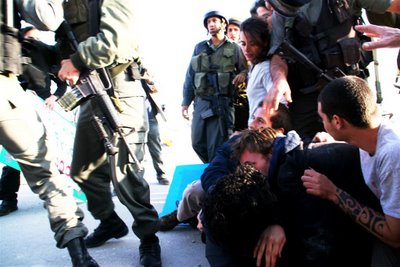
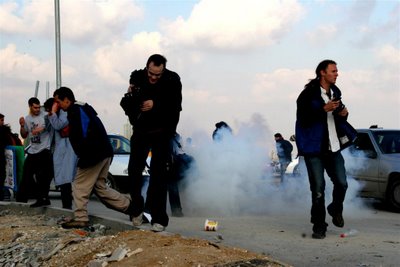
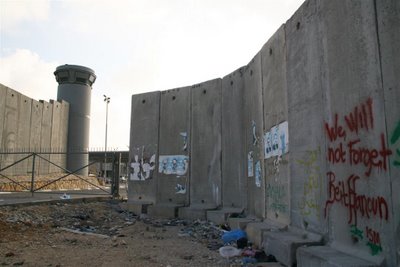
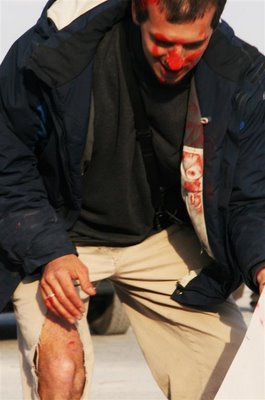
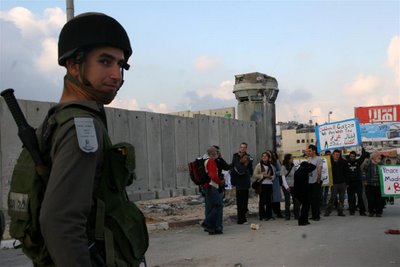
(c) Anne Paq/tourbillonphoto.com
Qalandia checkpoint, 19 Novembre 2006
Manifestation contre le massacre perpetué par l'armée israelienne a Beit Hanoun où une majorité de femmes et d'enfants ont été tués.
La manifestation pacifique n'a pas reuni grand monde. quelques personnes au plus faisant face a une dizaine de soldats qui n'ont guere apprecié de se faire asperger de peinture rouge...ils ont alors chargé et mis à terre quelques manifestants. Ils ont ensuite lancé une sound bomb en plein milieu des manifestants ce qui a blessé legerement un activiste.
Lorsque j'ai demandé à un soldat son opinion sur ce qui s"est passé à Gaza, il s'est contenté de me repondre "ce n'est pas mon probleme". Une reponse typique, je fais partie de l'armée mais je ne suis pas responsable de ce que l'armée fait. personne ne semble etre jamais responsable...
Et à Gaza l'offensive militaire continue. Hier encore un homme de 75 ans est décédé des suites de ses blessures. Cette nuit, dans un mouvement sans precedent, des centaines de Palestiniens se sont courageusement massés dans une maison d'un militant afin d'eviter un bombardement. un autre signe que les Palestiniens ne sont pas prets d'abdiquer.
Gaza continue d'etre assailli et tué a petit feu mais surement...en face de nos yeux.
alors que je veux fnir ce message je verifie les nouvelles: l'armée israelienne est de retour à Beit Hanoun. le pire est encore a venir.
ENGLISH
Demonstration at Qalandia checkpoint against the massacre in Beit Hanoun perpetuated by the Israeli army which continued to kill civilians in total impunity.
The non-violent demonstration only gathered a few people, a few internationals; Israelis and Palestinians eager to say their horror about what happened in Gaza.
They faced around 10 soldiers. One of them did not appreciate that a demontrator tried to put red paint on his uniform and he started with the other soldiers to charge and violently charged the demonstrators. Some of them fell on the floor. then the demonstrators went further away; and the soldiers threw sound bombs in the middle of the small crowed which resulted in a minor injury. the demonstrators were clearly non-violent and non-threatening.
I asked one of the soldiers what he thinks about what happened to Gaza. He just gave me a so much typical non-answer: " this is not my problem". typical; I am part of the army but i am in no way responsible about what the army does. Nobody seems to be ever responsible. But; in Gaza, even after the Beit Hanoun massacre during which a majority of children and women were killed, the military operations continue. Yesterday a 75-year old man died following his injuries.
Last night in an unprecedent move, hundreds of Palestitinians gathered in a house of a militant to prevent an Israeli bombing. Another sign that the Palestinians are not about to give up.
Gaza continues to be killed, slowly but surely...in front of our eyes.
I just checked the news before sending the message. It is announced that this Monday morning the Israeli army is back to Beit Hanoun...the worse is still about to come.
Sunday, November 12, 2006
Baqua, visit to a refugee camp in Jordan
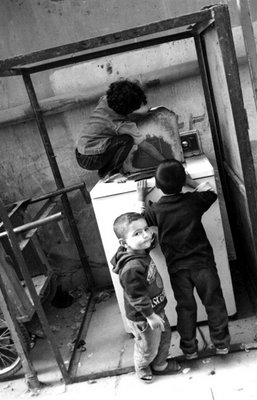
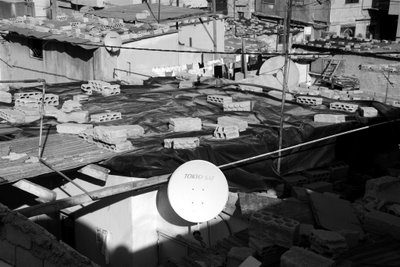


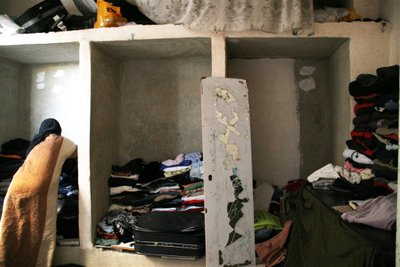
(c) Anne Paq/tourbillonphoto.com
Baqua'a, Palestinian refugee camp, Jordan.
Baqua'a, le plus grand camp de refugies palestiniens en Jordanie.
100,000 Palestiniens qui s'entassent. tous revent d'un retour, c'est leur droit.
Des gamins qui jouent autour d'une vieille machine a laver.
Des maisons sans vrais toits, des blocs de pierre retiennent les baches ou la tole utilisée.
Des interieurs presques nus, des vetements posees dans une armoire creusees dans les Murs.
Baqua'a, the biggest Palestinian refugee camp in Jordan.
100, 000 Palestinians surviving. everybody is dreaming about return; this is their right.
Kids playing around a used washing mashine.
homes without real roofs. stones all around to retain the plastic.
inside homes there is not much, no cupboard to put the clothes. most houses are not finished because of lack of money.
Dreaming Baqua, visit to a refugee camp in Jordan
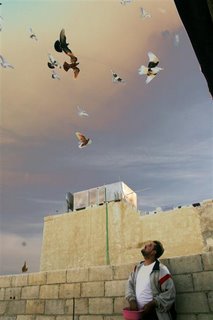
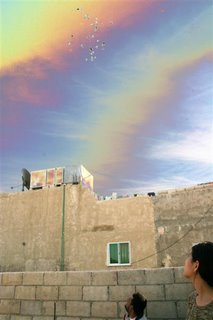
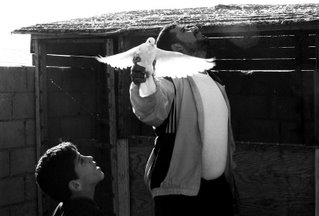
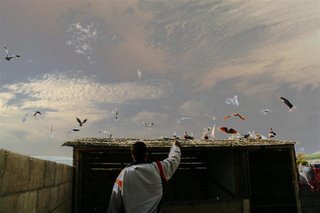
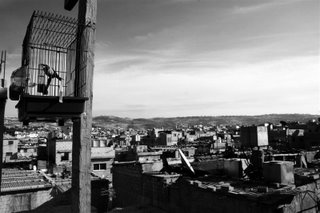
(c)Anne Paq/tourbillonphoto.com
"Dreaming Baqua'a", Baqua'a refugee camp, Jordan, november 2006.
Lors de mon sejour en Jordanie, une visite au camp de refugies de Baqu'a. avec 100,000 refugies, il s'agit du plus grand camp de refugies palestiniens en Jordanie. les conditions sont assez horribles dans le camp, sous haute surveillance.
During my stay in Jordan, i had the chance to visit Baqu'a refugee camp; not very far from Amman. With 100? 000 inhabitants it is the biggest in Jordan, and one of the worse. the living conditions are quite dreaful, under very tight control.
Thursday, November 09, 2006
Crime de guerre et massacre a Beit Hanoun
Pour les habitants de Beit Hanoun, Tsahal a tiré "délibérément"
LE MONDE | 09.11.06 | 13h42 • Mis à jour le 09.11.06 | 13h42
BEIT HANOUN ENVOYÉ SPÉCIAL
Il était près de 5 h 30, mercredi 8 novembre. Tout le monde dormait encore dans les faubourgs de Beit Hanoun, cette bourgade palestinienne de 30 000 habitants située dans le nord de la bande de Gaza, près de la frontière avec Israël. Le premier obus a percé le toit de la maison de la famille Athamana, ne laissant derrière lui que de la ferraille tordue. Il a explosé dans la chambre de trois adolescents, soufflant le balcon et criblant les murs d'éclats.
Pas une trace de sang sur les matelas. Les trois garçons ont été projetés du troisième étage et tués sur le coup. Dans la pièce voisine, une écolière de 13 ans, Khouloud, morte elle aussi, a laissé son cartable prêt pour la journée. De l'autre côté du mur, une femme de 25 ans, sa fille de 2 ans et son bébé de 6 mois n'ont pas survécu à l'explosion. Il ne reste que des débris, des chaussures éparses, et un porte-bébé vide.
Soudain, des cris. Ahjad a perdu deux de ses sept enfants. Il a été blessé à la jambe et revient de l'hôpital. "Mes enfants, mes enfants. Ils ont lancé des missiles sur mes enfants. J'ai tout perdu. Laissez-moi tranquille. Je vais aller tuer Sharon." Tel un somnambule, il parcourt les lieux du désastre en pleurant. Un homme s'emporte contre la presse. "A quoi cela sert d'écrire tout cela ? C'est toujours la même chose, toujours les mêmes tueries. Ça fait trop longtemps que cela dure, que l'on nous massacre et que rien ne change. Il ne nous reste plus que les attentats-suicides."
Le deuxième obus est tombé sur la maison voisine. Le trou est béant au-dessus du balcon. Il n'y a eu que des blessés. Les occupants avaient eu le temps de partir avant la déflagration. Dans la troisième maison, l'obus a touché l'angle du toit et a fait voler en éclats un pan de mur. Tout le monde est sorti, chacun se précipitant pour porter secours aux blessés. C'est alors qu'une autre salve d'obus est tombée. L'un d'eux a frappé la cage d'escalier de la première maison, tuant les fuyards. Un autre a transformé en charpie deux secouristes bénévoles. Des flaques de sang sont encore visibles dans la rue, au milieu des sandales perdues et des murs noircis troués d'éclats.
Combien d'obus sont-ils tombés en moins d'un quart d'heure ? Les habitants donnent le chiffre de treize. Au moins huit impacts ont été relevés. La presque totalité des dix-huit victimes - huit enfants, cinq femmes et cinq hommes - sont mortes dans le premier bâtiment. Les Israéliens l'avaient occupé avant leur retrait, mardi. Il leur permettait de dominer le secteur. Du toit, on voit les traces encore fraîches du passage des blindés et des chars. Omar Athamana ne comprend pas. Ce policier a perdu ses trois frères et deux cousins dans la tragédie. "J'étais avec Abou Mazen (Mahmoud Abbas), avec le Fatah, mais maintenant je ne suis plus avec personne. Je suis un terroriste, je suis un kamikaze. Car ce n'est pas une erreur, ce n'est pas une bavure. On aurait pu l'admettre s'il y avait eu un seul obus, mais pas tous ces tirs."
Le sentiment général est qu'il s'agit d'une punition, car, après six jours d'une opération qui a coûté la vie à cinquante-six Palestiniens, les tirs de roquettes ont repris de plus belle après le départ de Tsahal. Ghazi Ahmad, porte-parole du gouvernement, estime que la tuerie est "délibérée, que ce n'est pas une méprise et qu'en conséquence les attentats-suicides sont un droit légitime".
Chaque interlocuteur fait remarquer les moyens technologiques dont disposent les Israéliens, notamment les drones et le ballon dirigeable qui survole en permanence le secteur. "Ils savent exactement où les obus tombent. Alors, pourquoi les tirs d'artillerie continuent-ils ?", se demande un habitant de Beit Hanoun.
Après six jours de siège, la ville est sinistrée. Les chars ont défoncé les rues, écrasé les voitures, éventré les magasins, couché les pylônes électriques, crevé les conduites d'eau et les égouts. Même le cimetière n'a pas été épargné. De la mosquée vieille de huit siècles, il ne reste que le minaret.
Beit Hanoun croyait pouvoir respirer après l'assaut, mais la foudre s'est abattue de nouveau. A l'hôpital Kamal Adwan de Beit Lahiya, où ont été transportées les victimes, Ramez Athamana est au chevet de son fils de 7 ans, qui vient d'être amputé d'un pied. Il a perdu sa femme, ses deux filles, son père, sa grand-mère, sa belle-soeur, son frère, sa soeur, sa belle-mère. Au total, neuf de ses proches. Dans le lit voisin, une autre de ses belles-soeurs a eu le pied sectionné et l'avant-bras arraché. "Il ne me reste plus que la résistance, les attentats-martyrs", dit-il.
Lorsque Ismaïl Haniyeh, premier ministre, et Mahmoud Abbas, président de l'Autorité palestinienne, se présentent dans la chambre, une femme leur demande d'"assumer leurs responsabilités, de s'unir" et de prendre à leur charge les enfants des victimes. Il n'y a pas de larmes, pas de cris. Juste un sentiment d'injustice.
Michel Bôle-Richard
LE MONDE | 09.11.06 | 13h42 • Mis à jour le 09.11.06 | 13h42
BEIT HANOUN ENVOYÉ SPÉCIAL
Il était près de 5 h 30, mercredi 8 novembre. Tout le monde dormait encore dans les faubourgs de Beit Hanoun, cette bourgade palestinienne de 30 000 habitants située dans le nord de la bande de Gaza, près de la frontière avec Israël. Le premier obus a percé le toit de la maison de la famille Athamana, ne laissant derrière lui que de la ferraille tordue. Il a explosé dans la chambre de trois adolescents, soufflant le balcon et criblant les murs d'éclats.
Pas une trace de sang sur les matelas. Les trois garçons ont été projetés du troisième étage et tués sur le coup. Dans la pièce voisine, une écolière de 13 ans, Khouloud, morte elle aussi, a laissé son cartable prêt pour la journée. De l'autre côté du mur, une femme de 25 ans, sa fille de 2 ans et son bébé de 6 mois n'ont pas survécu à l'explosion. Il ne reste que des débris, des chaussures éparses, et un porte-bébé vide.
Soudain, des cris. Ahjad a perdu deux de ses sept enfants. Il a été blessé à la jambe et revient de l'hôpital. "Mes enfants, mes enfants. Ils ont lancé des missiles sur mes enfants. J'ai tout perdu. Laissez-moi tranquille. Je vais aller tuer Sharon." Tel un somnambule, il parcourt les lieux du désastre en pleurant. Un homme s'emporte contre la presse. "A quoi cela sert d'écrire tout cela ? C'est toujours la même chose, toujours les mêmes tueries. Ça fait trop longtemps que cela dure, que l'on nous massacre et que rien ne change. Il ne nous reste plus que les attentats-suicides."
Le deuxième obus est tombé sur la maison voisine. Le trou est béant au-dessus du balcon. Il n'y a eu que des blessés. Les occupants avaient eu le temps de partir avant la déflagration. Dans la troisième maison, l'obus a touché l'angle du toit et a fait voler en éclats un pan de mur. Tout le monde est sorti, chacun se précipitant pour porter secours aux blessés. C'est alors qu'une autre salve d'obus est tombée. L'un d'eux a frappé la cage d'escalier de la première maison, tuant les fuyards. Un autre a transformé en charpie deux secouristes bénévoles. Des flaques de sang sont encore visibles dans la rue, au milieu des sandales perdues et des murs noircis troués d'éclats.
Combien d'obus sont-ils tombés en moins d'un quart d'heure ? Les habitants donnent le chiffre de treize. Au moins huit impacts ont été relevés. La presque totalité des dix-huit victimes - huit enfants, cinq femmes et cinq hommes - sont mortes dans le premier bâtiment. Les Israéliens l'avaient occupé avant leur retrait, mardi. Il leur permettait de dominer le secteur. Du toit, on voit les traces encore fraîches du passage des blindés et des chars. Omar Athamana ne comprend pas. Ce policier a perdu ses trois frères et deux cousins dans la tragédie. "J'étais avec Abou Mazen (Mahmoud Abbas), avec le Fatah, mais maintenant je ne suis plus avec personne. Je suis un terroriste, je suis un kamikaze. Car ce n'est pas une erreur, ce n'est pas une bavure. On aurait pu l'admettre s'il y avait eu un seul obus, mais pas tous ces tirs."
Le sentiment général est qu'il s'agit d'une punition, car, après six jours d'une opération qui a coûté la vie à cinquante-six Palestiniens, les tirs de roquettes ont repris de plus belle après le départ de Tsahal. Ghazi Ahmad, porte-parole du gouvernement, estime que la tuerie est "délibérée, que ce n'est pas une méprise et qu'en conséquence les attentats-suicides sont un droit légitime".
Chaque interlocuteur fait remarquer les moyens technologiques dont disposent les Israéliens, notamment les drones et le ballon dirigeable qui survole en permanence le secteur. "Ils savent exactement où les obus tombent. Alors, pourquoi les tirs d'artillerie continuent-ils ?", se demande un habitant de Beit Hanoun.
Après six jours de siège, la ville est sinistrée. Les chars ont défoncé les rues, écrasé les voitures, éventré les magasins, couché les pylônes électriques, crevé les conduites d'eau et les égouts. Même le cimetière n'a pas été épargné. De la mosquée vieille de huit siècles, il ne reste que le minaret.
Beit Hanoun croyait pouvoir respirer après l'assaut, mais la foudre s'est abattue de nouveau. A l'hôpital Kamal Adwan de Beit Lahiya, où ont été transportées les victimes, Ramez Athamana est au chevet de son fils de 7 ans, qui vient d'être amputé d'un pied. Il a perdu sa femme, ses deux filles, son père, sa grand-mère, sa belle-soeur, son frère, sa soeur, sa belle-mère. Au total, neuf de ses proches. Dans le lit voisin, une autre de ses belles-soeurs a eu le pied sectionné et l'avant-bras arraché. "Il ne me reste plus que la résistance, les attentats-martyrs", dit-il.
Lorsque Ismaïl Haniyeh, premier ministre, et Mahmoud Abbas, président de l'Autorité palestinienne, se présentent dans la chambre, une femme leur demande d'"assumer leurs responsabilités, de s'unir" et de prendre à leur charge les enfants des victimes. Il n'y a pas de larmes, pas de cris. Juste un sentiment d'injustice.
Michel Bôle-Richard
nothing can justify what happened/what is happening in Gaza
A cease-fire in Gaza (2)
By Haaretz Editorial
Yesterday, we wrote here that "Israel should declare a complete cease-fire in the Gaza Strip for a predetermined period, during which it will not engage in any violent actions, neither assassinations nor incursions. Simultaneously, it should call on the Palestinians to hold their fire as well."
What we feared has come to pass - and for the Palestinians, even worse: At least 19 Palestinians were killed yesterday during a sustained Israel Defense Forces artillery attack on the town of Beit Hanun. Of these, 11 were members of a single family, including women and children.
No excuse can justify this atrocity. When artillery batteries aim their shells near a residential neighborhood, such a disaster is inevitable, even if it is unintentional.
Advertisement
Anyone who fired shells in the direction of civilian houses knows very well that he is liable to kill indiscriminately with them.
None of Israel's responses to this catastrophe - expressions of regret by the prime minister and defense minister, offers of humanitarian assistance to the wounded, the establishment of an inquiry committee headed by Major General Meir Kalifi, cessation of the shelling and the opening of the Rafah border crossing for a day - can paper over Israel's sole responsibility for this fearsome and senseless killing. Therefore, it is no longer enough to express regret; it is also necessary to draw conclusions.
It has now become conclusively clear that the campaign against the Qassam rocket launchers in Gaza can no longer be entrusted solely to the IDF. The chief of staff, the chief of command, the divisional commander, and the other officers who bear moral and operational responsibility for yesterday's disaster had failed even before this, during Operation Autumn Clouds, which ostensibly ended on Tuesday. That operation sowed only death and destruction, without bringing an end to the Qassam fire. On the contrary, it only increased it.
Yesterday's shelling therefore seems, above all, like an act of revenge by the IDF for the continued Qassam fire.
The prime minister, as the person who bears overall responsibility, must order the IDF to halt the fire on Gaza - immediately, in all cases and with every type of weapon.
If Israel does not want to find itself embroiled soon in a new bloodbath, including suicide bombings in its cities, it must launch a dramatic, unequivocal move, as only such a move might prevent the outbreak of a new intifada. Such a move must begin with a total cease-fire, even a unilateral one, in the context of which Israel will commit itself to total restraint for a predetermined period, even if Qassams continue to fall here and there.
Instead of more and more pointless military operations, which will not lead to anything except to kindling more hatred, we must try a completely different path. Instead of military operations with attractive names, we must immediately embark on a diplomatic operation.
The cannons must be replaced with calls for dialogue, the economic boycott must be replaced with an opening of the taps, and the cruel siege of Gaza must be replaced with a supervised opening of the border crossings.
Only in this way can we perhaps change the dangerous atmosphere that now prevails, and even more so following the bloodbath in Beit Hanun. The responsibility for this rests entirely on the prime minister's shoulders.
By Haaretz Editorial
Yesterday, we wrote here that "Israel should declare a complete cease-fire in the Gaza Strip for a predetermined period, during which it will not engage in any violent actions, neither assassinations nor incursions. Simultaneously, it should call on the Palestinians to hold their fire as well."
What we feared has come to pass - and for the Palestinians, even worse: At least 19 Palestinians were killed yesterday during a sustained Israel Defense Forces artillery attack on the town of Beit Hanun. Of these, 11 were members of a single family, including women and children.
No excuse can justify this atrocity. When artillery batteries aim their shells near a residential neighborhood, such a disaster is inevitable, even if it is unintentional.
Advertisement
Anyone who fired shells in the direction of civilian houses knows very well that he is liable to kill indiscriminately with them.
None of Israel's responses to this catastrophe - expressions of regret by the prime minister and defense minister, offers of humanitarian assistance to the wounded, the establishment of an inquiry committee headed by Major General Meir Kalifi, cessation of the shelling and the opening of the Rafah border crossing for a day - can paper over Israel's sole responsibility for this fearsome and senseless killing. Therefore, it is no longer enough to express regret; it is also necessary to draw conclusions.
It has now become conclusively clear that the campaign against the Qassam rocket launchers in Gaza can no longer be entrusted solely to the IDF. The chief of staff, the chief of command, the divisional commander, and the other officers who bear moral and operational responsibility for yesterday's disaster had failed even before this, during Operation Autumn Clouds, which ostensibly ended on Tuesday. That operation sowed only death and destruction, without bringing an end to the Qassam fire. On the contrary, it only increased it.
Yesterday's shelling therefore seems, above all, like an act of revenge by the IDF for the continued Qassam fire.
The prime minister, as the person who bears overall responsibility, must order the IDF to halt the fire on Gaza - immediately, in all cases and with every type of weapon.
If Israel does not want to find itself embroiled soon in a new bloodbath, including suicide bombings in its cities, it must launch a dramatic, unequivocal move, as only such a move might prevent the outbreak of a new intifada. Such a move must begin with a total cease-fire, even a unilateral one, in the context of which Israel will commit itself to total restraint for a predetermined period, even if Qassams continue to fall here and there.
Instead of more and more pointless military operations, which will not lead to anything except to kindling more hatred, we must try a completely different path. Instead of military operations with attractive names, we must immediately embark on a diplomatic operation.
The cannons must be replaced with calls for dialogue, the economic boycott must be replaced with an opening of the taps, and the cruel siege of Gaza must be replaced with a supervised opening of the border crossings.
Only in this way can we perhaps change the dangerous atmosphere that now prevails, and even more so following the bloodbath in Beit Hanun. The responsibility for this rests entirely on the prime minister's shoulders.
Tuesday, November 07, 2006
limonata ma nana a Ziryab.
7 novembre, Ramallah.
Aujourd’hui en partant pour un rendez-vous dans un café à deux minutes de chez moi, j’ai regardé mon sac d’appareil photo. Le prendre ou non ?
Je devais prendre mon ordinateur, alors je me suis dit, encore trois sacs pour moi pour aller juste à Zyriab ? bon oublions l’appareil photo pour une fois. Aussitôt je me souviens que chaque fois que je n’ai pas pris mon appareil, quelque chose se passe. La dernière fois c’etait une invasion militaire de Ramallah, j’avais alors couru pour aller récupérer mon appareil.
Une petite hesitation et me voilà partie.
Zyriab est un café tres connu à Ramallah, très agréable avec son ambiance très chaleureuse ; renforcée en hiver par un feu de cheminée. J’aime y prendre une Taybeh, la biere locale ou la limonata ma nana, un jus de citron avec de la menthe. Ils ont aussi le wifi, ce qui est très pratique. Le seul point absolument enervant est qu’ils passent sans cesse la même musique. J’ai d’ailleurs menacée aujourd’hui de me jeter par la fenêttre s’ils ne font pas un effort… mon rendez-vous était avec un autre photographe ; palestinien. Nous échangeons nos images, nos visions et idées. Je suis en train de développer une série de photos appelée « beautiful palestine », son site internet s’appelle www.beautifulpalestine.com.
Je lui explique mon dilemme par rapport à mon appareil photo et lui prédit que peut-être quelque chose va se passer aujourd’hui. Sourires echangés. Le photographe s’en va et je reste pour mon deuxième rendez-vous avec une amie palestinienne. Tout-à-coup des coups de feu, je jette un coup d’œil par la fenêtre, et je vois juste en face de nous un soldat israelien caché derriere un pan de mur, son œil rivé sur son viseur et qui bouge son arme dans toutes les directions. Oups. J’aperçois deux autres soldats mais je recule plus loin de la fenêtre. En intervenant en Ramallah en plein jour c’est une opération assez risquée pour les Israeliens et les soldats ont alors la gachette facile. Je maudis encore le fait de ne pas avoir mon appareil photo. Décidément la prophétie se confirme. Bon que faire ? je vois des pierres volées, et du gaz lacrimogène, encore quelques tirs. Puis rapidement beaucoup de personnes dans la rue, le signe que les soldats ont certainement bougé. Je décide donc de sortir et de chercher mon appareil. Mais le temps de rentrer et de prendre mon kit « invasion militaire » (gilet fluo ; bouteille d’eau, de quoi ecrire) et de ressortir, tout était fini. Je retourne en face de Zyriab, des personnes sont amassées autour d’une voiture dont une des vitres est brisée à l’arrière. Quatre militants ont été «arrêtés » lors de cette operation. Ils étaient assis à un café. On m’a dit qu’ils font partie des brigades de Al-Aqsa. Ils ont surment été donnés par un collaborateur. L’opération a été menée par les forces spéciales israéliennes, des agents habillés en civils, soutenus peu après par des soldats. Et hop, en 5 minutes c’etait bouclé.
Les rues ont l’air tout-à-fait normales. Je retourne à Zyriab et retrouve mon amie palestinienne. « Désolée d’être en retard, tu sais qu’il y avait les soldats ? ». « Non, vraiment ? », me repond-elle. Je commande une bière Taybeh. Ainsi va la vie sous occupation, on ne peut jamais se séparer de son appareil photo.
Aujourd’hui en partant pour un rendez-vous dans un café à deux minutes de chez moi, j’ai regardé mon sac d’appareil photo. Le prendre ou non ?
Je devais prendre mon ordinateur, alors je me suis dit, encore trois sacs pour moi pour aller juste à Zyriab ? bon oublions l’appareil photo pour une fois. Aussitôt je me souviens que chaque fois que je n’ai pas pris mon appareil, quelque chose se passe. La dernière fois c’etait une invasion militaire de Ramallah, j’avais alors couru pour aller récupérer mon appareil.
Une petite hesitation et me voilà partie.
Zyriab est un café tres connu à Ramallah, très agréable avec son ambiance très chaleureuse ; renforcée en hiver par un feu de cheminée. J’aime y prendre une Taybeh, la biere locale ou la limonata ma nana, un jus de citron avec de la menthe. Ils ont aussi le wifi, ce qui est très pratique. Le seul point absolument enervant est qu’ils passent sans cesse la même musique. J’ai d’ailleurs menacée aujourd’hui de me jeter par la fenêttre s’ils ne font pas un effort… mon rendez-vous était avec un autre photographe ; palestinien. Nous échangeons nos images, nos visions et idées. Je suis en train de développer une série de photos appelée « beautiful palestine », son site internet s’appelle www.beautifulpalestine.com.
Je lui explique mon dilemme par rapport à mon appareil photo et lui prédit que peut-être quelque chose va se passer aujourd’hui. Sourires echangés. Le photographe s’en va et je reste pour mon deuxième rendez-vous avec une amie palestinienne. Tout-à-coup des coups de feu, je jette un coup d’œil par la fenêtre, et je vois juste en face de nous un soldat israelien caché derriere un pan de mur, son œil rivé sur son viseur et qui bouge son arme dans toutes les directions. Oups. J’aperçois deux autres soldats mais je recule plus loin de la fenêtre. En intervenant en Ramallah en plein jour c’est une opération assez risquée pour les Israeliens et les soldats ont alors la gachette facile. Je maudis encore le fait de ne pas avoir mon appareil photo. Décidément la prophétie se confirme. Bon que faire ? je vois des pierres volées, et du gaz lacrimogène, encore quelques tirs. Puis rapidement beaucoup de personnes dans la rue, le signe que les soldats ont certainement bougé. Je décide donc de sortir et de chercher mon appareil. Mais le temps de rentrer et de prendre mon kit « invasion militaire » (gilet fluo ; bouteille d’eau, de quoi ecrire) et de ressortir, tout était fini. Je retourne en face de Zyriab, des personnes sont amassées autour d’une voiture dont une des vitres est brisée à l’arrière. Quatre militants ont été «arrêtés » lors de cette operation. Ils étaient assis à un café. On m’a dit qu’ils font partie des brigades de Al-Aqsa. Ils ont surment été donnés par un collaborateur. L’opération a été menée par les forces spéciales israéliennes, des agents habillés en civils, soutenus peu après par des soldats. Et hop, en 5 minutes c’etait bouclé.
Les rues ont l’air tout-à-fait normales. Je retourne à Zyriab et retrouve mon amie palestinienne. « Désolée d’être en retard, tu sais qu’il y avait les soldats ? ». « Non, vraiment ? », me repond-elle. Je commande une bière Taybeh. Ainsi va la vie sous occupation, on ne peut jamais se séparer de son appareil photo.
Monday, November 06, 2006
from Mona from Gaza
Cette fois c est un bus d'ecole qui a été touché par un obus israelien;
un adoloescent de 15 ans est mort, neuf autres ont été blessés et un professeur est grievement blessé...
From the blog:http://fromgaza.blogspot.com
children on their way to school in north Gaza Gaza
Gaza7.30 am -AlAwda Hospital -Jabalia camp
just few lines to let you all know , that nobody is safe in Gaza , while on their way to their school with their school bags , and their teacher on board of small school bus , the van has been attacked by one missile , teacher is seriously injured , 9 at least were ijured , one is killed , medical staff at AlAwda hospital are dealing with the injured , some were reffered to the shifa hospital ,in Gaza city .
all hospitals in the Gaza strip are working under big pressure ,and heavy load , due to the current Israeli operation against Gaza , on top of long period of economical sanctions , that left 70%of the population living on humanitarian aid .medics works under fire and very difficult situation, yesterday 2 medical rescue team men were killed while working , one of our staff in AlAwda hospital was injured the same day , all while on duty .
i have seen some of the shrapnels , that were recovered from the previous day injuries , with clear writing USA USA, the shrapnels seems unusual ,surgeons didnot come across before ,we donot have the time and facilities to investigatte , some experts might find results , any way killing of civilians is ilegal either with knives or internationaly abandended weapons .
my messege to all good American men and women , PLEASE PLEASE MAKE SURE THAT YOUR TAX MONEY ARE NOT USED FOR KILLING INNOCENT CIVILIANS IN GAZA
MOna with love and soliderity
un adoloescent de 15 ans est mort, neuf autres ont été blessés et un professeur est grievement blessé...
From the blog:http://fromgaza.blogspot.com
children on their way to school in north Gaza Gaza
Gaza7.30 am -AlAwda Hospital -Jabalia camp
just few lines to let you all know , that nobody is safe in Gaza , while on their way to their school with their school bags , and their teacher on board of small school bus , the van has been attacked by one missile , teacher is seriously injured , 9 at least were ijured , one is killed , medical staff at AlAwda hospital are dealing with the injured , some were reffered to the shifa hospital ,in Gaza city .
all hospitals in the Gaza strip are working under big pressure ,and heavy load , due to the current Israeli operation against Gaza , on top of long period of economical sanctions , that left 70%of the population living on humanitarian aid .medics works under fire and very difficult situation, yesterday 2 medical rescue team men were killed while working , one of our staff in AlAwda hospital was injured the same day , all while on duty .
i have seen some of the shrapnels , that were recovered from the previous day injuries , with clear writing USA USA, the shrapnels seems unusual ,surgeons didnot come across before ,we donot have the time and facilities to investigatte , some experts might find results , any way killing of civilians is ilegal either with knives or internationaly abandended weapons .
my messege to all good American men and women , PLEASE PLEASE MAKE SURE THAT YOUR TAX MONEY ARE NOT USED FOR KILLING INNOCENT CIVILIANS IN GAZA
MOna with love and soliderity
Sunday, November 05, 2006
Accepter l'inaceptable - avons nous perdu notre conscience?
Je n'ai pas trouvé un editorial dans les journeaux français pour denoncer ce qui se passe à Gaza.
Des civils se font tuer; une ville -beit hanoun- est coupée du monde et assiegée.
une fille de douze ans encore aujourd'hui a été tuée, une femme de 80 ans est aussi decédée aujourd'hui des suites de ses blessures lors d"une operation militaire a Bethlehem il y a quelques jours.
avez vous vu la video des femmes de Gaza qui ont osé sortir de leurs maisons pour aider les militants palestiniens? sur le monde:
http://www.lemonde.fr/
web/video/0,47-0@2-3218,54-830410@51-803567,0.html
la seule façon d'arreter les roquettes (l'excuse donnée par le gouvernement israelien pour justifier l'injustifiable) est d'en finir avec l'occupation et de negocier.
les attaques contre les civils palestiniens ne font qu'empirer la situation, et si encore certains pensent que les Palestiniens vont plier sous le poids des balles et des boycots; la determination de ces vieilles femmes; bravant le danger; demontre toute la stupidité d'une telle pensée.
Avec Liberman au gouvernement; qui a déjà commencé à parler des Arabes en Israel comme un "probleme" et qu'il faudrait une separation (comprenez transfert des populations arabes qui representent 20% de la population israélienne ou autrement dit un nettoyage ethnique) et ce qui se passe à Gaza; Israël tombe le masque et montre son vrai visage, mais tout le monde detourne le regard, y compris les Israeliens qui devraient etre dans la rue à l'heure ou j'ecris ces lignes.
Israël poursuit son opération à Gaza
47 Palestiniens ont été tués par l'armée israélienne en cinq jours, lors d'une des opérations les plus vastes depuis l'enlèvement d'un soldat israélien le 25 juin
Deux Palestiniens ont été tués dimanche 5 novembre au cours de l'offensive israélienne dans la bande de Gaza, que l'Etat hébreu a promis de poursuivre malgré le nombre croissant de morts et la poursuite des tirs de roquettes.
Au total, 47 Palestiniens, dont au moins 25 combattants, ont été tués par l'armée en cinq jours, lors d'une des opérations militaires les plus vastes depuis l'enlèvement d'un soldat israélien le 25 juin par des groupes armés palestiniens. Plus de 200 personnes ont été blessées.
Deux Palestiniens, un membre armé de la Sécurité nationale et un militant de la branche armée du Hamas, ont été tués par des tirs à Beit Hanoun (nord de la bande de Gaza), localité entièrement réoccupée depuis mercredi, selon une source médicale.
Un troisième Palestinien grièvement blessé samedi soir par des tirs dans la même localité est décédé des suites de ses blessures dimanche. Trois personnes ont été blessées quand l'armée israélienne a dynamité la maison d'un chef des Brigades des Martyrs d'al-Aqsa, groupe armé lié au parti Fatah.
"L'hôpital n'a pas d'électricité et manque d'eau"
Des chars et des bulldozers encerclaient par ailleurs l'hôpital de Beit Hanoun. Des soldats ont menacé par haut-parleur d'ouvrir le feu sur toute personne qui tenterait de sortir ou d'entrer dans l'établissement.
"Les soldats dans les chars nous ont demandé de fermer les entrées de l'hôpital et nous ont ordonné de ne pas bouger, sinon ils ouvriraient le feu", a affirmé le directeur adjoint de l'hôpital, Nasser Radouane. D'après lui, l'hôpital n'a pas d'électricité et manque d'eau pour les blessés et les malades.
Selon des images de la télévision palestinienne à Beit Hanoun, interdite d'entrée aux journalistes, l'armée a procédé dans la soirée de samedi à de nouvelles vagues d'arrestations d'hommes, emmenés dans des camions.
"Réduire les activités terroristes"
"L'opération est limitée dans le temps, mais nous n'avons pas l'intention d'annoncer quand elle prendra fin", a affirmé dimanche le premier ministre israélien Ehoud Olmert. "Nous avons déclaré que nous n'accepterions jamais les tirs de (roquettes) Qassam et que nous prendrions toutes les mesures nécessaires pour réduire les activités terroristes. Nous l'avons fait, nous le faisons et nous continuerons à le faire", a-t-il poursuivi.
Si les tirs de roquettes ont diminué ces derniers mois par rapport au début de l'année, ils n'ont cependant pas cessé. Selon l'armée, plus de 30 de ces engins ont été tirés depuis mercredi. Trois ont été tirés dans la matinée près de Sdérot sans faire de victimes.
Ehoud Olmert a assuré que "la plupart des Palestiniens tués étaient des hommes armés. Malheureusement, les Palestiniens utilisent des civils comme boucliers humains".
"Avec notre opération, Haniyeh est redevenu un héros"
La présidence de l'Union européenne, la Grande-Bretagne et la France ont appelé à la retenue et à épargner les civils, tout en réaffirmant le droit d'Israël "à se défendre". "Nous avons provoqué de lourdes pertes dans les rangs (des groupes armés), y compris parmi des activistes importants. L'armée a mis la main sur des stocks d'armes, l'opération les met sous pression, même s'il est très difficile d'empêcher totalement les tirs de roquettes", a de son côté indiqué le vice-ministre de la Défense Ephraïm Sneh.
Le chef du parti d'opposition de gauche Meretz, Yossi Beilin, a en revanche réclamé l'arrêt immédiat de cette opération qui, selon lui, "ne fait que renforcer la position d'Ismaïl Haniyeh", le premier ministre palestinien du Hamas.
"Haniyeh était très affaibli ces derniers temps (...). Avec notre opération, il est redevenu un héros et concurrence désormais Hassan Nasrallah (le chef du parti chiite libanais Hezbollah), avec toutes sortes de légendes qui courent sur lui grâce à nous", a-t-il estimé.
AFP
Gaza : le CICR déplore la mort de deux volontaires du Croissant-Rouge palestinien dans l’accomplissement de leur mission humanitaire
Genève / Tel Aviv (CICR) – Le Comité international de la Croix-Rouge (CICR) déplore la mort, le 3 novembre dans la bande de Gaza, de deux auxiliaires médicaux du Croissant-Rouge palestinien, et il est profondément bouleversé et attristé par cet événement.
Tous deux sont décédés des blessures subies alors qu’ils accomplissaient leur mission humanitaire vitale durant une opération militaire des forces armées israéliennes.
Le CICR est consterné par le fait que l’obligation de protéger le personnel engagé dans des activités médicales d’urgence n’a pas été respectée. Les personnes concernées et leurs moyens de transport arboraient clairement un emblème distinctif conférant la protection des Conventions de Genève.
Le 3 novembre, peu après 21 heures, les services médicaux d’urgence du Croissant-Rouge palestinien ont répondu à des appels signalant que des personnes avaient été blessées durant des opérations militaires conduites à Beit Lahiya, au sud-ouest de Beit Hanoun, dans le nord de la bande de Gaza. Un certain nombre d’ambulances, dont trois du Croissant-Rouge palestinien, sont arrivées sur les lieux. Les deux auxiliaires médicaux avaient chacun revêtu une veste fluorescente clairement identifiée du Croissant-Rouge palestinien et étaient munis de grandes lampes torches quand ils ont quitté l’ambulance pour accomplir leur devoir humanitaire. La sirène de l’ambulance avait été actionnée et le gyrophare du véhicule était visible de loin. Les auxiliaires médicaux étaient en train d’évacuer un corps lorsque des munitions des forces armées israéliennes ont touché le site. L’un des auxiliaires a été tué sur le coup ; l’autre, gravement blessé, est décédé quelques heures plus tard.
« Cet incident souligne qu’il est urgent d’améliorer, à travers le respect des règles du droit international humanitaire, la protection des équipes médicales opérant dans des zones de conflit, a déclaré Dominik Stillhart, chef de délégation du CICR en Israël et dans les territoires occupés. Ces règles imposent aux parties à un conflit de respecter et de protéger le personnel engagé dans des activités médicales et de faire la distinction entre les objectifs militaires d’une part, et les civils et les biens de caractère civil de l’autre ». Le Croissant-Rouge palestinien est membre du Mouvement international de la Croix-Rouge et du Croissant-Rouge. En vertu du droit international humanitaire, son personnel et ses moyens de transport médicaux doivent être protégés et respectés en toutes circonstances.
Des civils se font tuer; une ville -beit hanoun- est coupée du monde et assiegée.
une fille de douze ans encore aujourd'hui a été tuée, une femme de 80 ans est aussi decédée aujourd'hui des suites de ses blessures lors d"une operation militaire a Bethlehem il y a quelques jours.
avez vous vu la video des femmes de Gaza qui ont osé sortir de leurs maisons pour aider les militants palestiniens? sur le monde:
http://www.lemonde.fr/
web/video/0,47-0@2-3218,54-830410@51-803567,0.html
la seule façon d'arreter les roquettes (l'excuse donnée par le gouvernement israelien pour justifier l'injustifiable) est d'en finir avec l'occupation et de negocier.
les attaques contre les civils palestiniens ne font qu'empirer la situation, et si encore certains pensent que les Palestiniens vont plier sous le poids des balles et des boycots; la determination de ces vieilles femmes; bravant le danger; demontre toute la stupidité d'une telle pensée.
Avec Liberman au gouvernement; qui a déjà commencé à parler des Arabes en Israel comme un "probleme" et qu'il faudrait une separation (comprenez transfert des populations arabes qui representent 20% de la population israélienne ou autrement dit un nettoyage ethnique) et ce qui se passe à Gaza; Israël tombe le masque et montre son vrai visage, mais tout le monde detourne le regard, y compris les Israeliens qui devraient etre dans la rue à l'heure ou j'ecris ces lignes.
Israël poursuit son opération à Gaza
47 Palestiniens ont été tués par l'armée israélienne en cinq jours, lors d'une des opérations les plus vastes depuis l'enlèvement d'un soldat israélien le 25 juin
Deux Palestiniens ont été tués dimanche 5 novembre au cours de l'offensive israélienne dans la bande de Gaza, que l'Etat hébreu a promis de poursuivre malgré le nombre croissant de morts et la poursuite des tirs de roquettes.
Au total, 47 Palestiniens, dont au moins 25 combattants, ont été tués par l'armée en cinq jours, lors d'une des opérations militaires les plus vastes depuis l'enlèvement d'un soldat israélien le 25 juin par des groupes armés palestiniens. Plus de 200 personnes ont été blessées.
Deux Palestiniens, un membre armé de la Sécurité nationale et un militant de la branche armée du Hamas, ont été tués par des tirs à Beit Hanoun (nord de la bande de Gaza), localité entièrement réoccupée depuis mercredi, selon une source médicale.
Un troisième Palestinien grièvement blessé samedi soir par des tirs dans la même localité est décédé des suites de ses blessures dimanche. Trois personnes ont été blessées quand l'armée israélienne a dynamité la maison d'un chef des Brigades des Martyrs d'al-Aqsa, groupe armé lié au parti Fatah.
"L'hôpital n'a pas d'électricité et manque d'eau"
Des chars et des bulldozers encerclaient par ailleurs l'hôpital de Beit Hanoun. Des soldats ont menacé par haut-parleur d'ouvrir le feu sur toute personne qui tenterait de sortir ou d'entrer dans l'établissement.
"Les soldats dans les chars nous ont demandé de fermer les entrées de l'hôpital et nous ont ordonné de ne pas bouger, sinon ils ouvriraient le feu", a affirmé le directeur adjoint de l'hôpital, Nasser Radouane. D'après lui, l'hôpital n'a pas d'électricité et manque d'eau pour les blessés et les malades.
Selon des images de la télévision palestinienne à Beit Hanoun, interdite d'entrée aux journalistes, l'armée a procédé dans la soirée de samedi à de nouvelles vagues d'arrestations d'hommes, emmenés dans des camions.
"Réduire les activités terroristes"
"L'opération est limitée dans le temps, mais nous n'avons pas l'intention d'annoncer quand elle prendra fin", a affirmé dimanche le premier ministre israélien Ehoud Olmert. "Nous avons déclaré que nous n'accepterions jamais les tirs de (roquettes) Qassam et que nous prendrions toutes les mesures nécessaires pour réduire les activités terroristes. Nous l'avons fait, nous le faisons et nous continuerons à le faire", a-t-il poursuivi.
Si les tirs de roquettes ont diminué ces derniers mois par rapport au début de l'année, ils n'ont cependant pas cessé. Selon l'armée, plus de 30 de ces engins ont été tirés depuis mercredi. Trois ont été tirés dans la matinée près de Sdérot sans faire de victimes.
Ehoud Olmert a assuré que "la plupart des Palestiniens tués étaient des hommes armés. Malheureusement, les Palestiniens utilisent des civils comme boucliers humains".
"Avec notre opération, Haniyeh est redevenu un héros"
La présidence de l'Union européenne, la Grande-Bretagne et la France ont appelé à la retenue et à épargner les civils, tout en réaffirmant le droit d'Israël "à se défendre". "Nous avons provoqué de lourdes pertes dans les rangs (des groupes armés), y compris parmi des activistes importants. L'armée a mis la main sur des stocks d'armes, l'opération les met sous pression, même s'il est très difficile d'empêcher totalement les tirs de roquettes", a de son côté indiqué le vice-ministre de la Défense Ephraïm Sneh.
Le chef du parti d'opposition de gauche Meretz, Yossi Beilin, a en revanche réclamé l'arrêt immédiat de cette opération qui, selon lui, "ne fait que renforcer la position d'Ismaïl Haniyeh", le premier ministre palestinien du Hamas.
"Haniyeh était très affaibli ces derniers temps (...). Avec notre opération, il est redevenu un héros et concurrence désormais Hassan Nasrallah (le chef du parti chiite libanais Hezbollah), avec toutes sortes de légendes qui courent sur lui grâce à nous", a-t-il estimé.
AFP
Gaza : le CICR déplore la mort de deux volontaires du Croissant-Rouge palestinien dans l’accomplissement de leur mission humanitaire
Genève / Tel Aviv (CICR) – Le Comité international de la Croix-Rouge (CICR) déplore la mort, le 3 novembre dans la bande de Gaza, de deux auxiliaires médicaux du Croissant-Rouge palestinien, et il est profondément bouleversé et attristé par cet événement.
Tous deux sont décédés des blessures subies alors qu’ils accomplissaient leur mission humanitaire vitale durant une opération militaire des forces armées israéliennes.
Le CICR est consterné par le fait que l’obligation de protéger le personnel engagé dans des activités médicales d’urgence n’a pas été respectée. Les personnes concernées et leurs moyens de transport arboraient clairement un emblème distinctif conférant la protection des Conventions de Genève.
Le 3 novembre, peu après 21 heures, les services médicaux d’urgence du Croissant-Rouge palestinien ont répondu à des appels signalant que des personnes avaient été blessées durant des opérations militaires conduites à Beit Lahiya, au sud-ouest de Beit Hanoun, dans le nord de la bande de Gaza. Un certain nombre d’ambulances, dont trois du Croissant-Rouge palestinien, sont arrivées sur les lieux. Les deux auxiliaires médicaux avaient chacun revêtu une veste fluorescente clairement identifiée du Croissant-Rouge palestinien et étaient munis de grandes lampes torches quand ils ont quitté l’ambulance pour accomplir leur devoir humanitaire. La sirène de l’ambulance avait été actionnée et le gyrophare du véhicule était visible de loin. Les auxiliaires médicaux étaient en train d’évacuer un corps lorsque des munitions des forces armées israéliennes ont touché le site. L’un des auxiliaires a été tué sur le coup ; l’autre, gravement blessé, est décédé quelques heures plus tard.
« Cet incident souligne qu’il est urgent d’améliorer, à travers le respect des règles du droit international humanitaire, la protection des équipes médicales opérant dans des zones de conflit, a déclaré Dominik Stillhart, chef de délégation du CICR en Israël et dans les territoires occupés. Ces règles imposent aux parties à un conflit de respecter et de protéger le personnel engagé dans des activités médicales et de faire la distinction entre les objectifs militaires d’une part, et les civils et les biens de caractère civil de l’autre ». Le Croissant-Rouge palestinien est membre du Mouvement international de la Croix-Rouge et du Croissant-Rouge. En vertu du droit international humanitaire, son personnel et ses moyens de transport médicaux doivent être protégés et respectés en toutes circonstances.
life has lost its meaning; did we lose our conscience?
Listen to Maj. Gen. Stern
By Gideon Levy
A bloodbath is taking place in Beit Hanun, the Israel Defense Forces runs rampant and kills at least 37 people in four days - and Israeli public opinion yawns with indifference. A brigade commander tells his soldiers, who killed 12 people in one day: "You've won 12:0," and the soldiers grin broadly. This is the moral nadir we have reached, following a long slide down a slippery slope: Human life has become cheap.
Proof of this came at the end of the week from the big mouth of Major General Elazar Stern, the head of the IDF Personnel Directorate, who occasionally says true things. "The IDF's excessive sensitivity to human life led to some of the failures in the Lebanon war - and this should not happen," Stern told Channel 7. Stern should be praised for these forthright words: Those who embark with unbearable lightness on a futile war of choice cannot allow themselves the luxury of showing sensitivity for the lives of their soldiers. In war, soldiers not only kill, but are also killed. This should have been stated in advance.
But the general's remarks are also tainted with hypocrisy: Those who over a few months kill more than 1,000 Lebanese and 300 Palestinians for dubious reasons do not have the right to speak about sensitivity to human life. The fact that the public protest against the war did not take off demonstrates that after having lost all sensitivity for the lives of others, we are also gradually losing sensitivity for the lives of our children who are killed in vain. The contempt for human life starts with the lives of Arabs and ends with the lives of Jews.
What a long way we have come since the talk, as hypocritical as it may have been, about "the purity of arms." This concept has been totally deleted from the lexicon. What a long way we have come since the time when we took pride in the fact that, unlike the Arabs, we tried not to kill innocent civilians. And now we have arrived at the shocking reality of the second Lebanon war. For example, the number of people Israel killed is not only almost 10 times higher than the number of people Hezbollah killed, but the number of soldiers Hezbollah killed is three times higher than the number of Israeli civilians they killed, while the number of Lebanese civilians killed by Israel is about three times the number of Hezbollah fighters. So whose arms are purer? A journalist from The Guardian who is currently in Israel was shocked to hear that these figures have not been the subject of public discussion here.
The current stage of the moral decline began with the targeted assassinations in the territories. When they began, there was still an argument over their legality and justness. Who remembers that the assassinations were once limited, declaratively at least, to "ticking bombs"? The High Court of Justice, in its cowardice, has evaded taking a stance on this issue for years, despite the petitions on its doorstep. And the assassination project grew and expanded until it reached monstrous proportions.
In recent months, almost no day has gone by without Palestinians being killed in Gaza. Instead of asking why, we get a prime minister who boasts to the Knesset Foreign Affairs and Defense Committee about "300 terrorists" dead within four months, as if killing in itself were an enormous achievement. This is the lesson from Ehud Olmert, and it is immeasurably more grievous than all his alleged corruption affairs.
No one asked who these fatalities were, whether they all deserved to die, and what benefit Israel derives from this wholesale killing. Beyond the terrifying number of civilians killed, including dozens of women and children, we should also ask whether every armed person in Gaza - and there are tens of thousands of them - deserves the death penalty, without a trial. The day the IDF began the targeted assassinations, our sensitivity to human life was doomed to be erased.
The IDF has been operating in the town of Beit Hanun for several days now. Operation Autumn Clouds is ostensibly intended to target Qassam launchers, but meanwhile it has only brought more Qassams on Sderot - besides the killing, destruction and terror it sows in the heart of the 30,000-resident town. I was at the Beit Hanun home of the Abu Ouda family twice recently. The first time was when a shell destroyed the family's home. The second time was when soldiers killed the father, his son and his daughter, who were innocent of any crime. And this was before Operation Autumn Clouds.
And how is the Israeli press covering Autumn Clouds? In Maariv on Thursday, you needed a magnifying glass to find an offhand reference to the killing of 10 Palestinians in one day; it was the same for Yedioth Ahronoth. The two newspapers with the country's largest circulation demonstrate a disgusting level of dehumanization. The statement by Yedioth Ahronoth's military commentator, Alex Fishman, that one of the operation's goals is drilling the troops for the "big operation," does not stir any protest. That the IDF is embarking on a "training operation" in a dense population center, sowing death and destruction - does this not show a frightening contempt for human life?
The daily killing in Gaza receives scant mention. Futile operations aimed at restoring the IDF's lost honor do not arouse any debate about their aim, morality or chances of succeeding. No one wonders about the extent of Qassam damage versus the extent of the killing and destruction - including the bombing of the power station - in Gaza, where a million and a half people are encaged, impoverished and hungry.
These futile operations will not stop the Qassams, which are aimed at giving us and the rest of the world a painful reminder of the imprisoned and boycotted Gaza residents' distress, which no one would notice if it were not for the Qassams. The way to fight the Qassams is to stop the boycott, sit down at the negotiating table and reach an accord. Otherwise, we will continue to slide and become immune to their loss of life, and soon to our loss of life as well. Listen to Major General Stern.
By Gideon Levy
A bloodbath is taking place in Beit Hanun, the Israel Defense Forces runs rampant and kills at least 37 people in four days - and Israeli public opinion yawns with indifference. A brigade commander tells his soldiers, who killed 12 people in one day: "You've won 12:0," and the soldiers grin broadly. This is the moral nadir we have reached, following a long slide down a slippery slope: Human life has become cheap.
Proof of this came at the end of the week from the big mouth of Major General Elazar Stern, the head of the IDF Personnel Directorate, who occasionally says true things. "The IDF's excessive sensitivity to human life led to some of the failures in the Lebanon war - and this should not happen," Stern told Channel 7. Stern should be praised for these forthright words: Those who embark with unbearable lightness on a futile war of choice cannot allow themselves the luxury of showing sensitivity for the lives of their soldiers. In war, soldiers not only kill, but are also killed. This should have been stated in advance.
But the general's remarks are also tainted with hypocrisy: Those who over a few months kill more than 1,000 Lebanese and 300 Palestinians for dubious reasons do not have the right to speak about sensitivity to human life. The fact that the public protest against the war did not take off demonstrates that after having lost all sensitivity for the lives of others, we are also gradually losing sensitivity for the lives of our children who are killed in vain. The contempt for human life starts with the lives of Arabs and ends with the lives of Jews.
What a long way we have come since the talk, as hypocritical as it may have been, about "the purity of arms." This concept has been totally deleted from the lexicon. What a long way we have come since the time when we took pride in the fact that, unlike the Arabs, we tried not to kill innocent civilians. And now we have arrived at the shocking reality of the second Lebanon war. For example, the number of people Israel killed is not only almost 10 times higher than the number of people Hezbollah killed, but the number of soldiers Hezbollah killed is three times higher than the number of Israeli civilians they killed, while the number of Lebanese civilians killed by Israel is about three times the number of Hezbollah fighters. So whose arms are purer? A journalist from The Guardian who is currently in Israel was shocked to hear that these figures have not been the subject of public discussion here.
The current stage of the moral decline began with the targeted assassinations in the territories. When they began, there was still an argument over their legality and justness. Who remembers that the assassinations were once limited, declaratively at least, to "ticking bombs"? The High Court of Justice, in its cowardice, has evaded taking a stance on this issue for years, despite the petitions on its doorstep. And the assassination project grew and expanded until it reached monstrous proportions.
In recent months, almost no day has gone by without Palestinians being killed in Gaza. Instead of asking why, we get a prime minister who boasts to the Knesset Foreign Affairs and Defense Committee about "300 terrorists" dead within four months, as if killing in itself were an enormous achievement. This is the lesson from Ehud Olmert, and it is immeasurably more grievous than all his alleged corruption affairs.
No one asked who these fatalities were, whether they all deserved to die, and what benefit Israel derives from this wholesale killing. Beyond the terrifying number of civilians killed, including dozens of women and children, we should also ask whether every armed person in Gaza - and there are tens of thousands of them - deserves the death penalty, without a trial. The day the IDF began the targeted assassinations, our sensitivity to human life was doomed to be erased.
The IDF has been operating in the town of Beit Hanun for several days now. Operation Autumn Clouds is ostensibly intended to target Qassam launchers, but meanwhile it has only brought more Qassams on Sderot - besides the killing, destruction and terror it sows in the heart of the 30,000-resident town. I was at the Beit Hanun home of the Abu Ouda family twice recently. The first time was when a shell destroyed the family's home. The second time was when soldiers killed the father, his son and his daughter, who were innocent of any crime. And this was before Operation Autumn Clouds.
And how is the Israeli press covering Autumn Clouds? In Maariv on Thursday, you needed a magnifying glass to find an offhand reference to the killing of 10 Palestinians in one day; it was the same for Yedioth Ahronoth. The two newspapers with the country's largest circulation demonstrate a disgusting level of dehumanization. The statement by Yedioth Ahronoth's military commentator, Alex Fishman, that one of the operation's goals is drilling the troops for the "big operation," does not stir any protest. That the IDF is embarking on a "training operation" in a dense population center, sowing death and destruction - does this not show a frightening contempt for human life?
The daily killing in Gaza receives scant mention. Futile operations aimed at restoring the IDF's lost honor do not arouse any debate about their aim, morality or chances of succeeding. No one wonders about the extent of Qassam damage versus the extent of the killing and destruction - including the bombing of the power station - in Gaza, where a million and a half people are encaged, impoverished and hungry.
These futile operations will not stop the Qassams, which are aimed at giving us and the rest of the world a painful reminder of the imprisoned and boycotted Gaza residents' distress, which no one would notice if it were not for the Qassams. The way to fight the Qassams is to stop the boycott, sit down at the negotiating table and reach an accord. Otherwise, we will continue to slide and become immune to their loss of life, and soon to our loss of life as well. Listen to Major General Stern.
Tuesday, October 31, 2006
Le drapeau palestinien s'eleve toujours a Bilin/ the Palestinian flag is still rising at Bilin
Monday, October 23, 2006
Ramadan Time
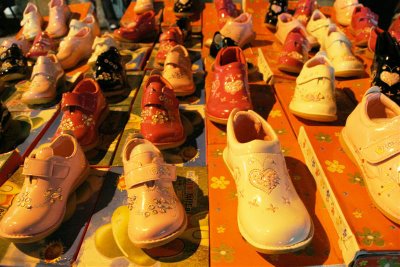
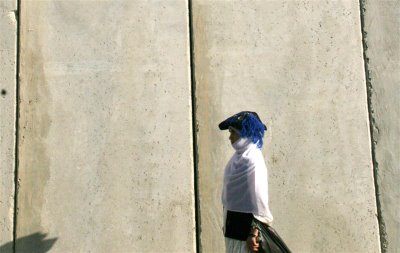
(c) Anne Paq/tourbillonphoto.com
Ramadan time, October 2006.
Cocktail de Ramadan
(English Follows)
Le Ramadan touche à sa fin. J’ai aimé de vivre ce temps ici. Certains internationaux n’ont pas aimé être là à cette periode. Il faut faire attention à ne pas manger ni boire dans la rue pendant la journée. Les restaurants et cafés ne servent plus d’alcool à part un à Ramallah qui est devenu alors très populaire. Les gens quittent leur bureau à 2 heures de l’apres midi. Le travail devient plus lent. Les gens deviennent aussi plus nerveux plus irritables, surtout à partir de 3 heures de l’apres midi. Tout le monde se demande alors, comme tous les jours : « serais-je à l’heure à la maison pour Iftar ? » (iftar est le moment où on casse le jêune, vers 17 heures le soir apres avoir jeûné toute la journée). Les embouteillages deviennent aussi encore plus importants. Les klaxons retentissent ainsi que les petards et les feux d’artifices le soir. On a appris à distinguer ces sons des balles mais ce n’est pas plus agreable aux oreilles.
La plupart des Palestiniens respectent Ramadan, mais bien sûr certains détournent les règles et on les voit fumer et boire leur café dans les arrières-boutiques…mais il y a vraiment une atmosphère spéciale. J’aime être ici dans cette période. J’aime tous ces patisseries spéciales et ces jus aux couleurs bizarre que tout le monde vend au coin des rues. J’aime voir les familles sorir le soir. Les illuminations. Le marché dans les rues avec les bonbons, les bottes rose bonbons, les barapapa…tant de couleurs. Il est vrai que cette année c’est un oeu dur, beaucoup ne peuvent pas acheter autant de cadeaux que d’habitude. J’aime bien sûr l’iftar, le moment de la journée, vers cinq heures, quand le soleil se couche, où nous cassons le jeûne après toute une journée sans manger ni boire. Tout le monde se retrouve. Le Muzzin (la personne qui chante de la mosquée) commence à réciter le Coran, mais il faut encore attendre qu’il prononce le « Allah Akbar » (Allah est grand). Il y a dans l’air une impatience, une joyeuse attente avec de commencer le repas. Traditionnellement nous commençons par un verre d’eau et une date. Je ne jêune pas. Je bois dans la journée mais j’ai prisl’habitude de ne pas manger. Je suis donc impatiente aussi tous les jours et le repas est une fête, un partage. Une de mes meilleures amies qui est Palestinienne, Amani, m’appelle toujours pour savoir oùje vais passer iftar. Pas question de me laisser manger seule. L’iftar c’est avant tout un partage. J’observe que dans sa famille, ils mangent tous ensemble pour le ramadan, alors que d’habitude ils mangent à des heures différentes.
Comme toujours, mais encore plus que d’habitude, les photos que j’ai prises lors de cette période sont toutes en contrastes. Dans ces occasions, l’occupation semble encore plus cruelle. Des personnes affamées coincées à des checkpoints ; des Palestiniens qui ne peuvent aller visiter leurs proches de l’autre côté du Mur ; Gaza sans electricité ; des personnes gênées car ils ne peuvent donner des cadeaux. Des pères, des fils, des mères, des filles en prisons ou morts…en ces temps de fête ; l’absence des proches (et il y en a dans chaque famille) se fait cruellement sentir. A partir de 3 heures, quand les Palestiniens essayent précisement de rentrer chez eux ; les checkpoints deviennent bizarrement plus lents. Pourquoi vérifier ces vieilles femmes palestiniennes entre bethlehem et Hebron qui rentrent chez elles ? Hier je suis allée faire le tour des checkpoints car c’etait le dernier vendredi du ramadan. A Qalandia (le checkpoint principal entre la cisjordanie du nord et jerusalem) c était le chaos. Tous les hommes en dessous de 45 ans ne pouvaient pas passer. Je garde en tête l’image d’une vieille femme discutant avec un soldat impassible. Il l’a envoyé ballader, sans lui parler, d’un simple revers de la main. Joyeux Ramadan. Jérusalem, si proche du cœur de tous les Palestiniens, et seulement à quelques kilomètres est resté innacessible pour la plupart. Ensuite nous avons continué notre tour en suivant le mur, en direction de Jerusalem. A Al Ram nous avons rencontré des soldats qui nous ont joyeusement expliqué leurs grands succes de la journée : « nous avons coupé des cordes et cassé les échelles » (les Palestiniens, en desespoir de cause, ont essayé de passer le Mur en employant des cordes et des echelles). Grands succes de l’armée israélienne. A Jerusalem ; la foule etait quand même impressionnante (même si beaucoup de Palestiniens de Cisjordanie n’ont pu se rendre à Jerusalem, il y a bien sûr les 200 000 Palestiniens résidents de Jérusalem Est et les Palestiniens résidents en Israël). Une rivière de pélerins deferlant de la porte de Damas.
Le soir, de retour chez moi, je regarde les informations sur la chaîne française. Je suis contente car ils ont montré les incidents qui ont eu lieu pendant la journée, notamment à Bethlehem où la plupart des Palestiniens n’ont pas pu passer. Les images des soldats en train de battre et de lancer des gaz lacrimogènes au milieu de la foule sont choquantes. Je me demande si ces images seront montrées en Israël. J’en doute fort.
Joyeux Ramadan ; voila ci-dessous une série de photos que j’ai prises lors de cette période, une nouvelle fois tout en contraste d’un Ramadan sous occupation. Ramadan, les patisseries, et les checkpoints ; un cocktail difficile à avaler.
ENGLISH
Ramadan Cocktail
Ramadan is almost over. It was a good time to be here. Some foreigners do not like it so much. You have to be careful not to eat openly in the streets during the day; also not to drink.
Most restaurant and bars do not serve alcohool during Ramadan; which makes the fortune of the only restaurant in Ramallah which continues to serve some. Between 3 and 5, many people are getting edgy and nervous after a whole day of fasting. I have seen a lot of fighting. Traffic jams also are getting worse during Ramadan time. It is also definitly not a good time if you want to work hard. People finish early, everything slows down.
The everyday main question is: will I be at home for iftar? (iftar is the moment where you break the fast and eat with your family).
Most persons respect Ramadan but some are also sneaking around with the rules- smoking and drinking at the back of the shops…but still there is a general sense of a special time. I like it. I like all the sweets and to see families out at night, walking around and looking at the market. The lights and the balloons. But many cannot buy as many things as usual.
I like iftar when everybody comes together to eat. There is a sense of impatience. Everybody waits to hear the “Allah Akbar” (Allah is great) from the Mosque. Then you can finally drink and eat. I took the habit not to eat but I drink during the day. Not to eat was not so difficult and it was nice to be at the same rythm as the Palestinians. Me too I am everyday impatient to hear the Allah Akbar and enjoy the sharing of the food. One of my best friends, Amani, who is Palestinian always calls me before iftar to know when I am going to eat. Because nobody is supposed to eat alone during Ramadan. In that family usually they do not eat together but in Ramadan time they do.
As always, and maybe more than even, the impressions and the pictures I took are all in contrast. Maybe in those times; the occupation appears to be all the more cruel. People being hungry stuck at checkpoint; Palestinians not being able to visit their relatives on the other side of the Wall, Gaza without electricity, people ashamed because they cannot buy as many presents as usual. Fathers and sons, mothers and daughters in prisons…in each family the absence of the loved ones will be felt more. At 3pm the checkpoints seem to be slower than usual.. Why checking these old Palestinian women who try to go back to their homes to have dinner on the road to Bethlehem to Hebron? Yesterday again I went around to the checkpoints for the last Friday of Ramadan. It was chaos in Qalandia, all the men aged below 45 years old were not allowed to pass. An old woman was arguing with the soldier that did not bother to answer and just dismissed her by a gesture of his hand. Happy Ramadan. Jerusalem so close to the hearts of many and only a few kilomers away remains out of reach. We continue to walk. We met some soldeiers that were just standing there and talked to us about their big achievements of the day: “we cut some rope and break the ladders!” (Explanation: the last days some Palestinians- desperate to get to Jerusalem- try to climb the Wall using ropes and ladders). In Jerusalem still there was in impressive crowd. 250 000 Muslims, pouring out of Damascus Gate like a river.
At the evening I was glad to see that French television showed the images of what happened in Bethlehem where many Palestinians were stuck at the checkpoint. The soldiers charged, beat some Palestinians and threw some tear gas in the middle of the crowed. I was wondering- were these images shown on Israeli media? I doubt it.
Happy Ramadan, here is a series of pictures that reflect the constrasted images of Ramadan under occupation. Sweets and checkpoints- a cocktail quite difficult to swallow….



